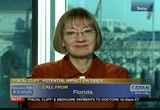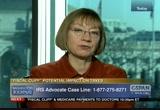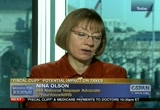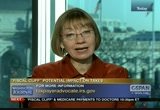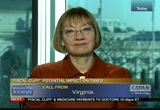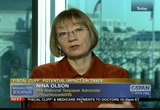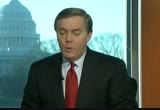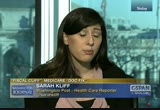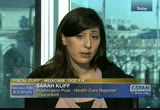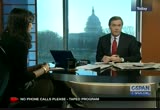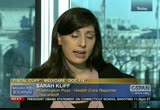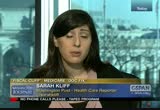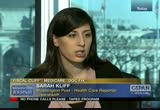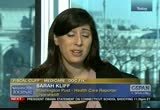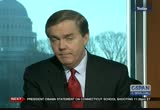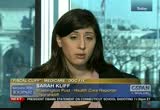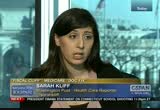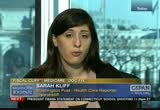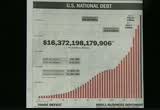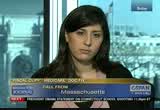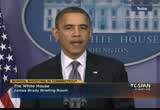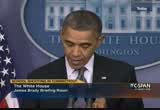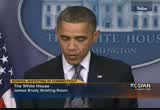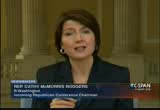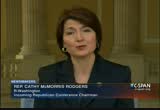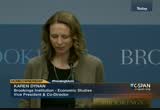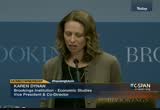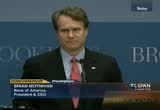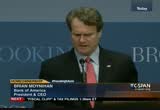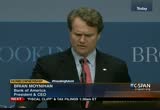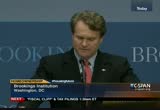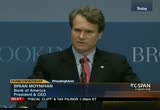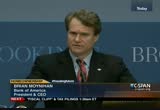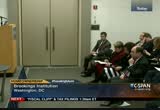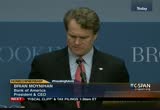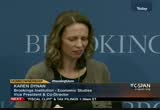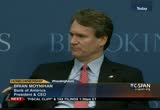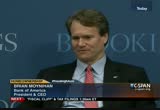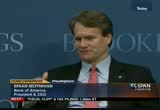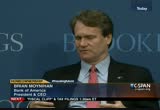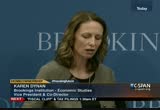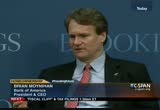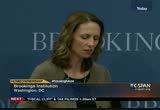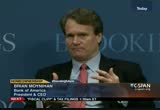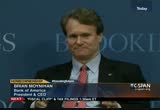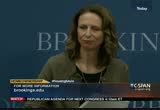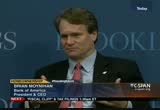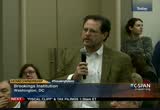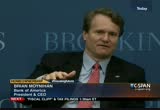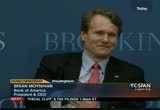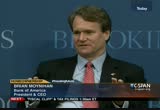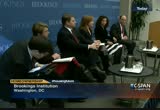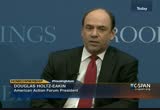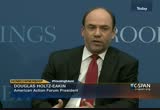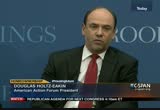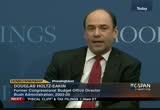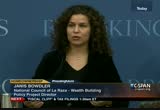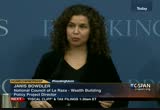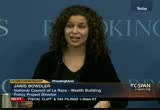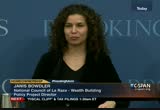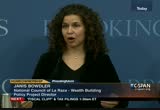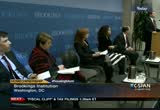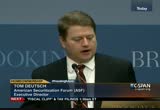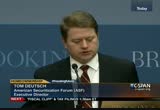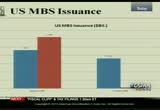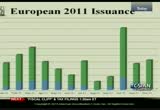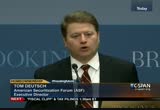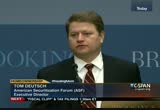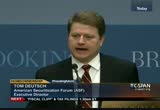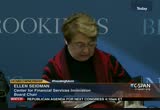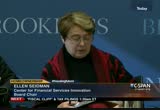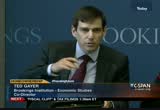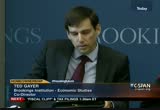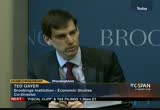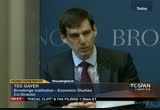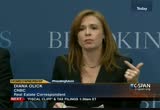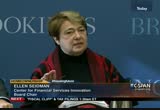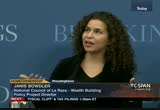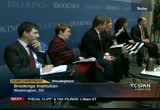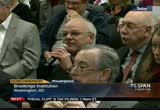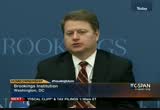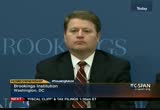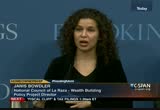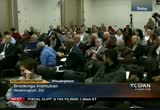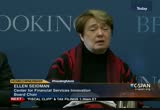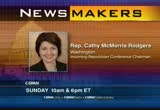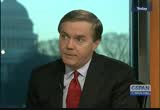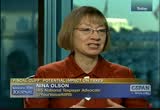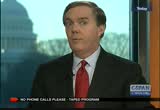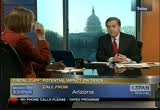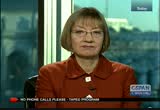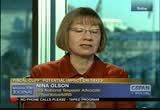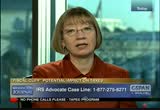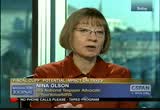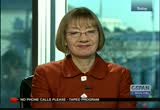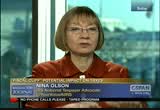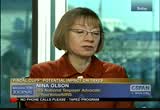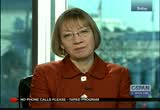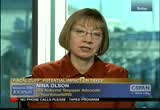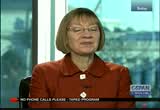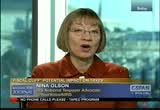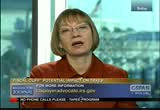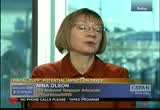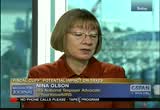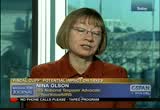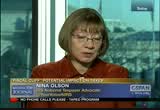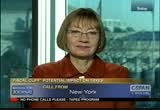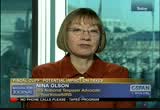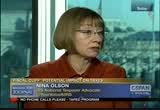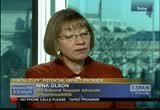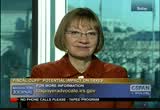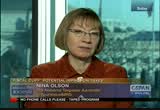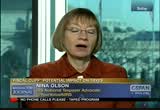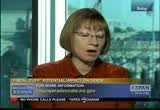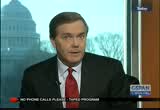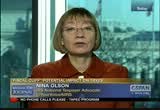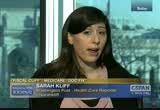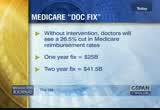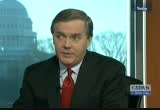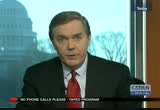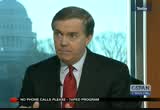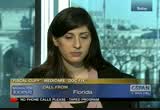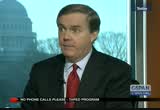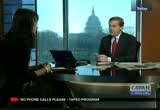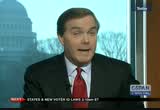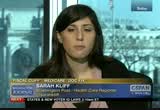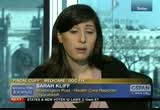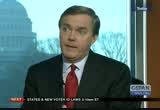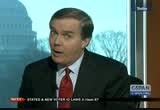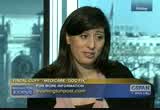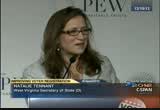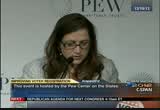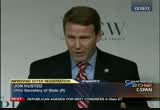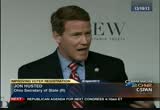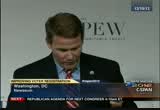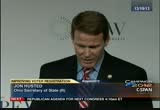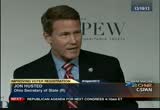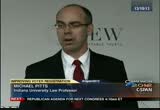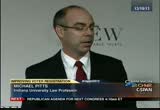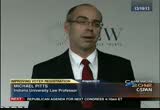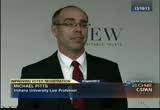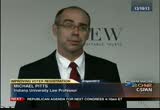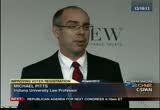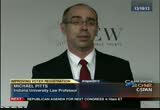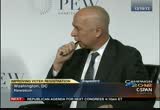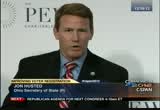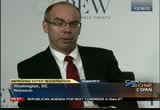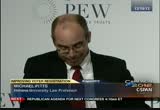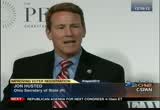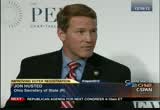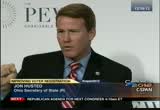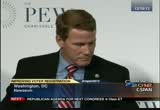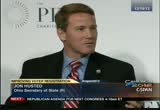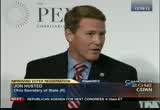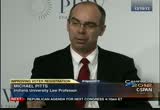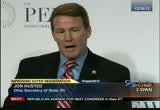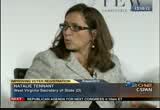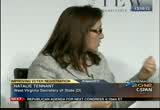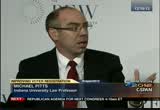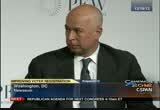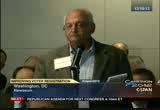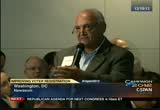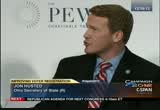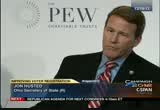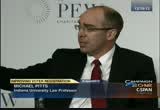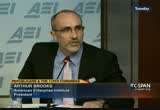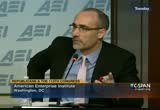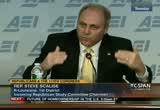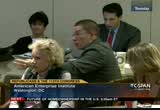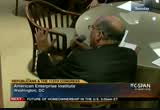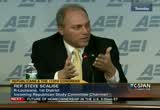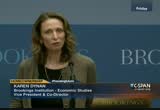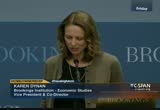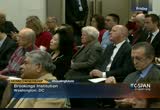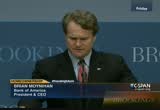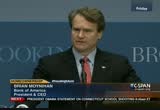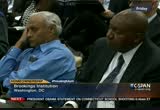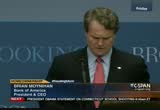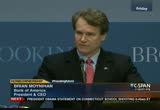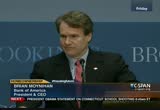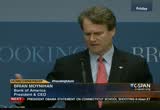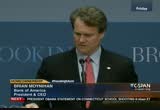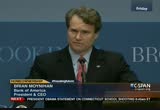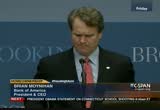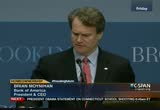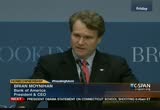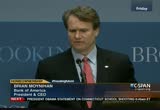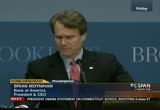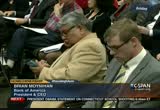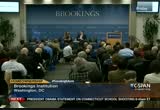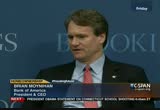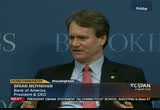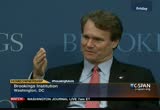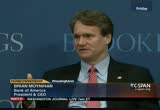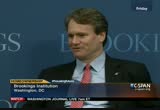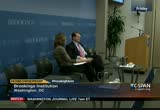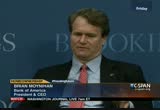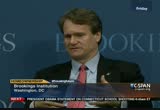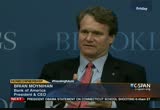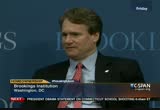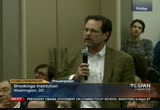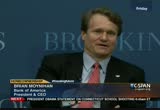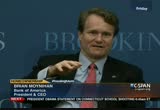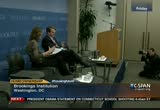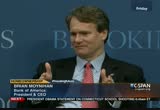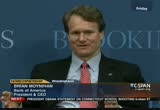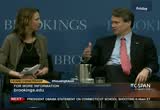tv Politics Public Policy Today CSPAN December 14, 2012 10:30pm-6:00am EST
10:30 pm
they still cannot get enough money to balance a budget. guest: i don't really have a role to play in that other than to say that the way you need to be raising money needs to be as understandable and transparent as possible for the taxpayers said they know what is going on with their money. what of it -- one of our recommendations is that when people file their taxes that the government sent back to them and itemized receipt that shows them here is what you paid and here is where your tax breaks camp from. -- came from. then here is where your dollars are going in the federal budget. in the instructions for the
10:31 pm
form 1040, they have a pie chart that shows this goes to defense, this goes to social spending, paying interest, but i really think it could be much more detailed. i think that kind of education, letting taxpayers know where their money is going, will make a more informed citizenry and update the debate on where you want your money to go as the tax paying public. that is something that i am strongly advocating. i think that will go far. that is the first step to saying, wait a minute, i do not want this amount of my money going or i am ok with this now that i understand. host: from one of our viewers -- guest: i am not sure that taxes are going up for obamacare.
10:32 pm
there is a tax credit in the law that enables a large number, millions and millions of taxpayers, to be able to afford health insurance. there are tax credits in the law right now for small businesses to be able to purchase health insurance for their employees. we have an estimator on their website to help small businesses, on taxpayeradvocate.irs.gov, to help them estimate whether this complicated provision would make a difference for them before they even tried to go through all the calculations. i think it is not clear to me that taxes are going up. there are taxes on tanning, some miscellaneous taxes that are going up, and there is a
10:33 pm
tax going into place for health insurance because the idea is that one way to restrain medical costs and spending is to basically tax. if you want to spend a lot of money on non-essentials medical expenses, then you can do that but we are going to basically, we meaning the congress, decided to tax that portion of the amount that is over a basic insurance plan. host: our next caller is from virginia on the democrats' line. good morning. caller: hi. i have a general question. i am 21 years old. i have been working since i was 16 years old, and my mom has always claimed me on my taxes. i am pretty much wondering -- she always told me i should not file because i would somehow
10:34 pm
miss her upper. -- mess her up. guest: these laws about dependency exemptions are complicated and something we have tried to simplify. if you are a student full-time, you can be claimed on your parents' return as a dependent up until the age of 24. at the age of 19, you are not to be claimed on your parents' return unless you are really there depended -- really their dependent. if you had a certain amount of income that you would not be able to be claimed on your parents return. this is a fairly easy issue for the irs to track. it would seem to me you are being clamped properly on her
10:35 pm
return. on the other hand, if you are leaving school, and that is a moment where you have to say i am filing my own income tax return because now you are no longer a student. host: if you want to write down this number, the taxpayer advocate phone number is -- the website? guest: taxpayeradvocate.irs.gov. host: nina olson, welcome back to c-span and thank you for being with us.
10:36 pm
host: we want to welcome sarah kliff, a health care reporter with "the washington post." as we continue our series, we want to take a look at different aspects of what we can expect as we face the january 1 deadline. we want to talk about the said likely the doc fix. many people say you have to understand the doc fix. guest: it is something we have had since about a decade ago. back in 1997, congress set a formula for how to pay doc fares. it worked for about five years until the cost of health care started growing. what we have seen every year is congress passed a temporary pay patch to make up the difference. every year, we get to the end
10:37 pm
of the year and there is this impending gap. right now if we do not pass it, medicare salaries will go down by 25%. everyone thinks the doc fix is not a good idea and we should fix it permanently. it is something that we face every year. host: if nothing happens next year, the cost is estimated to be $25 billion. over two years, $41 billion. guest: it is expensive and we always have to find a way to pay for it. we are looking for some other cuts that we can make to total those amounts. the price tag goes up to $244 billion for the next decade. host: what does it mean if you are a doctor accepting medicare patients? guest: every year this becomes a debate.
10:38 pm
i think a lot of doctors assume it is going to get fixed so you usually do not see doctors at the end of the year say i am not going to receive patients. many would say i am not going to take that pay cut. we have not seen that phenomenon play out because every year washington has come through with stabilizing their paychecks. host: they have come through with sgr. what is that and what is the formula? guest: it is the formula that congress created back in 1997, the one that they thought would determine how much doctors got paid. it is a pretty tricky business to try to figure out how much our medical costs are going to grow. it worked for about five years. than the cost of health care outpaced the formula.
10:39 pm
it proved not to be sustainable at all. each year we have had to shore up the formula. host: how did this come about? guest: it was back in 2002 was the first time when the sustainable growth rate was too small, where doctors had to take a pay cut that fleer -- that year. so they passed the first pay patch. that has grown every year since and has become a bigger budget item. host: let me take this from two sides. how is washington preparing for this? guest: usually there is a lot of talk about the doc fix at the end of the year. it is just one of many issues facing congress.
10:40 pm
even though it has become bigger, you hear less about it right now because of all the other issues that are happening. you do see doctors on the hill lobbying on the issue wanting to make sure the pay cut does not go through and they want to make sure that revenues do not get cut in the process, that certain reimbursement levels are not being lost for them. host: back in 2002, doctors -- congress did not implement the doc fix. what led to their inaction years ago? guest: my understanding was the first year it happened, it was a smaller cut. we were not looking at the 26% cut at that point. it had been working for the past five years. i think that is why in 2003 you
10:41 pm
saw people saying we are not taking a cut again. host: if you are a physician, what should you prepare for? guest: there have been a few times where they have gone past the deadline by a few weeks and medicare has held off on processing claims. they can usually do that for about a few weeks or so. if we are not able to get this fixed, you might be looking at some disruptions in your billing process. however they are able to pass a few months of funding, business should pretty much continue as normal. host: sarah kliff with "the washington post." our phone lines are open and you can also send us a tweet or an e-mail. iris joining us from virginia, the republican line, good morning. caller: good morning.
10:42 pm
i just feel like -- hello? host: go ahead. guest: the speaker that is speaking, sarah kliff, i beg to differ with her because we have been without a doctor -- my husband is on medicare and i am still paying for an individual policy. we have been without a doctor since back in june and our group practice has told us they cannot get a doctor. the doctors that are coming out on the going into general practice or internal medicine because of the medicare situation, that they are going where they can make more money. we are still without a doctor. host: what are you doing? caller: they will give us a flu shot or whatever but as for having a doctor that new our routine and would be able to --
quote
10:43 pm
that we would feel comfortable with, we are waiting for one to have on staff. we go to the doctors in orange county. it is a university of virginia practice
10:44 pm
host: thank you for the call. guest: i think that question speaks to a larger problem in our health care system right now where primary doctors and the services they provide are being paid less
10:45 pm
>> we are not throwing america's seniors over the cliff to get a tax cut for the wealthiest people of america. we have clarity on that. host: sarah kliff? guest: the eligibility age quickly shaping up to be a big issue for the fiscal cliff. house republicans have said this is something they want to come out of these negotiations. congressional democrats, one of the top senators, has said we are not on board with it. it is difficult to see where that issue lands. what that will mean even chile is moving the age up to 67 -- will mean eventually is moving the age up to 67.
10:46 pm
host: the issue of spending, a large majority goes to these programs, medicare and medicaid, social security. speaker boehner was speaking about that yesterday. >> i am not concerned about my job. i am concerned about doing the right thing for our kids and grandkids. if we do not fix this spending problem, their future is going to be rather bleak. host: this doc fix will cost potentially $25 billion. where is the debate heading? guest: it is heading into the holiday season as there seems to be an impasse between the two political parties. most expect to see changes are cuts -- or cuts.
10:47 pm
moving the eligibility age to age 67 is one of the big changes they have talked about and probably others that will come up in the next week or so. host: here is a headline from your paper, "the washington post." saying that the problem for states, that revenues are decreasing while health care costs are skyrocketing. guest: medicaid has become a huge budget item. states are now spending more on medicaid, the program that covers low income americans, more on that program than
10:48 pm
education which is eating up a growing part of the state budget. a lot of folks in washington do not expect that to get cut. that goes to the fact they are trying to convince state to participate in the part of the health care law that would expand medicaid to everyone are earning less than $15,000 a year. they do not want to send the wrong message. however, that puts more pressure on trying to find cuts for medicare. host: dealing with all this is year to year corrections or changes or adjustment. why not make some long-term adjustments to the so-called doc fix? guest: and let the people in washington advocate for -- a lot of people in washington advocate for that. the problem is it is very expensive. it is a lot easier even though it is less stable and most folks in washington do not like it, it is easier to find $25 billion. host: our guest is sarah kliff from "the washington post."
10:49 pm
our next caller is linda joining us from florida. good morning. caller: good morning, steve. i love your show. most of my education has come from the "washington journal." host: thanks, linda. caller: i am a health care provider and we do not need a doc fix. there are multiple health care providers in the united states. the ama lobby is the biggest lobby entity that is out there. they don't want nurse practitioners, physician assistants, and others in the field to be able to have a seat at the table with providing health care. every patient does not need to see a doctor.
10:50 pm
our system is greedy. our medicare system is so bad now because of physicians who do not want to share or who see themselves as the sole entity. there is so much overcharging from medical equipment and pharmaceutical companies. their need to be something done. what happened to physicians making a meager same day living as their fellow man? this nation is -- we are just fallen apart from greed. nobody wants anyone else to have more than what they have. we need to be looking out for our neighbors. host: will that bend the curve of health care costs? caller: there is going to come a time when you will not even
10:51 pm
need to see a physician for hypertension or a nurse practitioner. once you know what the parameters are for high blood pressure, you can be treated by medication that can be prescribed and all of you will have to do is follow up. we have to think out of the box. we are providers with the same education. a lot of news practitioners have taken the medical exam. the ama and the positions want to snuff you out. host: thank you for your call. guest: i think you speak to a big issue in the debate right now. something that we call scope of practice. i think that is going to become
10:52 pm
more of an issue in 2014 when the health care law starts adding millions of people to the health care system. nurse practitioners, their lobby here in washington has said he will need more of us to see all these patients. we will see what happens with expanding our health care system to cover more people if health care professionals start playing a bigger role. host: what is the med pack plan? guest: it is a group that advises congress and makes recommendations on how to fix the medicare program. they have come up with recommendations to eliminate the doc fix. it is a plan that usually does not get much traction here in washington.
10:53 pm
host: here are some numbers that put this into perspective over the next nine years through 2021. the total cost would be about $200 billion. inflation through 2021, $350 billion. the simpson-bowles plan, about $250 billion. if you freeze payments through 2021, in excess of $300 billion. guest: these are all different plans that propose different savings for the medicare program. even if you are going to freeze payments, you have a lot of people coming into the program in the coming two decades. there is really no easy solution. there is no week -- no easy way to solve our spending
10:54 pm
problem. host: our next caller is roger joining us from illinois. good morning. caller: people are not having a problem finding doctors or hospitals. i have to differ with that. i had to go through six doctors before i could find one that could take me because i was going on medicare. i was on the company plan for 40 years and they offered me a plan that really no doctors would except, including the new hospital here in town. host: what would your doctor -- what did your doctor say? caller: he would not accept the health care plan i went on.
10:55 pm
i had to go on to humana. the doctor's office would not accept that any longer. i have to go to a hospital in the next town over. i've found a doctor over there and he is a good doctor but the reason is is because he accepts everybody basically. he is a good doctor. it is the next town over. they just won't accept it. i went through six doctors including my own previous doctor. this notion that everybody will accept it, she was just wrong and i think maybe the people in washington just do not understand. their answer is we do not get
10:56 pm
paid. host: darrell says -- guest: i think what you are speaking to is the doc fix that we have right now. if you look at our work force, we do not have enough doctors to serve our population. we are going to be above 30,000 primary care physicians short of what we need to take care of our population. some of those gaps might be filled by nurse practitioners or physician assistants, but it is a challenge for medicare, private insurance, and the
10:57 pm
medicaid program which tends to pay doctors the least. what you see some doctors doing to make up the difference, something referred to as up-coding. it gets a higher reimbursement rate or invests in more expensive technology. i think that is an issue that is recognized by many, that we really do need more health care professionals as baby boom merge -- as baby boomers begin to age. host: on our twitter page, this is one of you were saying -- -- this is one viewer saying -- from california, good morning.
10:58 pm
caller: only 15 states have agreed to set up the exchanges. 24 states are not going to set them up. earlier this morning, they said there are only a couple taxes involved. there are 18 taxes hitting mostly the middle class out of this health care plan and almost 1200 fees that are going to be levied against the middle class. our president is taking a 20-day vacation in hawaii to cost the taxpayers $4 million. he is just going to blame the republicans and let the taxes go up on everybody. host: grace says -- guest: medicare's costs have grown slower than the private insurance market. even though it is a big expense for the federal government, it
10:59 pm
would be even more expensive if we were growing at the same rate of private insurance. medicare has millions and millions of patients and to negotiate much lower rates. on the flip side of that, the issues we talked about earlier about doctors not wanting to participate. medicare has a huge population so they are able to streamline a lot of the education costs. host: another comment on our twitter page -- guest: malpractice is an issue that came up in the health care debate but did not move for that much.
11:00 pm
it is one solution that might make doctors more comfortable in their practice, that they are now worried about getting sued all the time. most of the estimates show it most of the estimates show it would be relatively small in the world of health care spending. it is something that comes up in the debate. host: as you well know, one of the fastest per cent of the growing population, baby boomers retiring, and the president's health care law, more people are requiring health care and more people in the health care system and yet doctors that will not satisfy the need. guest: a big challenge for the health care law is when you give people insurance, how do they
11:01 pm
get care? what is the obama administration has looked at it is a bigger focus on primary- care. they are running the program to fill some of the gaps we heard about this morning with there are not enough people. the health care law increases reimbursement rates for medicaid doctors to encourage them to stick with the program. i think you're also going to see a lot of people who are positioned assistance and a nurse practitioners stepping up to play a bigger role as they have more and more patients.
11:02 pm
host: the next call is from jacksonville, florida. good morning. caller: good morning. i am concerned about medicaid. i was employed for years and was diagnosed with cancer. for a while, by insurance paid for -- my insurance paid for it. the cobra was too expensive for me because i was drawing disability. i was -- they told me i could not apply for medicare until 2014 which i did not understand. i am 58. then i had to apply for medicaid. medicaid has a care cost and not familiar with. -- care cost i am not familiar with. maybe $1,100, if you do not make that quota by the end of the month, you have to pay that total bill. when i talked to someone, i
11:03 pm
said -- my income is $1,200 something a month. how can my care cost be so high? she said it was not based on my income. the doctor who i have, the primary care i had when i was on my insurance policy, they no longer take medicaid. my chemo doctor tells me that they accept medicaid but they have to get an ok from medicaid. guest: i think access to care is a big challenge for the medicaid program and will continue to be. it will expand about 17 million people over the next decade as the health care law takes effect. doctors who tend to get paid less than private insurance, they say are not even breaking
11:04 pm
even and cannot afford to see these patients. one thing the obama administration did was to raise primary care rates to meet those of the medicare program. that is one thing that starts in january of this coming year, one thing that might address the problem. host: one of our viewers has this to say -- guest: it is hard to know what are the right prices. most research shows our prices are much higher than the rest of the country. a lot of that has to do with the fact that the united states is one of the few countries that
11:05 pm
does not have rate setting. so, it is left to the private market and to legislators and regulators here. we have set the prices much higher than the rest of the world. host: how many will lose health care? guest: it is hard to say at this point. most parts of the expansion have not happened. most people will gain health insurance. it is getting at the issue of will health insurance be worthwhile. i think that is still an open question that we will see as the insurance system absorbs all these people.
11:06 pm
host: from stella -- do you have an estimate? guest: i do not know what it is. i know the costs have been rising but i would suggest if you look around at some sources, you will be able to find an answer. host: richard is joining us from florida on the independent line. good morning. caller: good morning. what i am interested in is in three parts of our health care system. as americans, we have to knowledge or accept or choose the health care is a right in our country and not a privilege. i think that requires an agreement and has to be stated and communicated to everyone and we require leadership. secondly, we have to look at what we're willing to do to support people because a majority of the people, probably those 65 or older, demand will require the greatest
11:07 pm
amount of our health care dollars so we have to plan for that. we have to understand that young people will not require as much and make a dedicated effort to plan for the costliest part of our population. then i think the third thing that we require is more participation of people, and not just requiring or putting us on our government. we have to demand answers and do our own research. we have to tune into more programs like "washington journal." host: richard, thank you. guest: the points you are raising are the points that we have had in this health care debate. we are moving to a system which will look at much closer like universal coverage where almost everyone is going to have access.
11:08 pm
but will also require people to purchase insurance which is a requirement that is the least popular in the health care law that went all the way to the supreme court this year and was ultimately upheld. as we move toward a system that has almost everyone participating, it is going to require people to take a more active role in their health care. host: tim has this question on our twitter page -- guest: my understanding is there are some reimbursements. some of the biggest differences we know about is doctors tend to operate in different ways in
11:09 pm
different parts of the country. a lot of research has looked at variations of how much care costs in various types of the country, and they found huge differences in what it might cost to get a knee replacement in one area versus another. they found that the spending does not aligned with the quality of care -- align with the quality of care. host: grace says -- guest: and a lot of the limits -- a bottleneck in our health care system comes from congress where medicare funds most of the presidency slots. -- residency slots. those are largely paid for by medicare, and there is a cap on how many medicare will pay for
11:10 pm
it to control the costs. it is seen as a big bottle neck which stems back to legislation that caps how many residency slots our governments will fund. host: ben bernanke spoke to reporters earlier this week about the potential of what we could face if congress does not reach an agreement. no public meetings are scheduled on the fiscal cliff today. next, virginia on a republican line, good morning. caller: my question was on medicaid/medicare eligibility for non-residents. it seems like in the past, the united states became a retirement system for the whole
11:11 pm
world. a 65-year-old got medicaid, free nursing-home, state buy-ins to assist. i know they changed the length of time required for non- residents to qualify based on the immigration status, but are there any changes to the limit or help more people? do you know anything about that? guest: i do not know as much about that subject. i know it is a huge area of debate. what i do know and one thing that has been controversial is the health care law -- its subsidies will not be spent to a number of folks who qualify under the modified dream act that was passed by the president earlier this year.
11:12 pm
i don't know as much about immigration status and how that interacts with health care benefits. there could be some changes on the way. host: this viewer saying -- guest: there is a big difference between the two. traditional medicare is the program that is run by the government. it is with the majority of beneficiaries with the government -- medicare advantage is when you work with a private plan that manages your medicare. medicare advantage is smaller than traditional medicare but enrollment has been increasing over the past decade. medicare advantage plans tend to
11:13 pm
get reimbursed more than the traditional public plan. host: will we ever see a permanent doc fix? guest: that is a great question and i think something that a lot of people in washington would like to see. it seems very unlikely that we will find the $244 billion necessary to pull it off. they would need some other opportunity where this became a huge priority. host: arizona is when our next -- where our next caller is coming from. good morning. caller: good morning. i had to go on disability -- yeah, i'm here. host: we can hear your question. caller: i had to go on disability at an early age.
11:14 pm
[laughter] host: i am going to move on. what are they facing in terms of going onto medicare or medicaid? guest: you are basing a lot of the issues affecting the general population. the various reimbursements that you get from the government -- and a lot of the issues that we have been talking about with the doc fix, strained medicaid budget, that is going to affect anyone in the program. host: this came up in terms of doctors charging a lot more. if you have been in the emergency room or a hospital, the prices today are itemized
11:15 pm
and there seems to be a lot of inflation. guest: there are a few factors driving up health care costs. some of it is technology where we have all these new fancy items. doctors -- if a hospital down the street has a fancy, new machine, then i have to have that, too. a lot of the rising costs and technology are driving this increase in costs. you look at the past few years of health care spending, the actual volume of health care has either gone down a little bit or has remained constant where people are going to the doctor a lot more. the prices are growing faster
11:16 pm
than the rate of inflation, and we are seeing some of that driven largely by technology. that is coming on the market. the obama administration is taking some steps. there is the accountable care organizations. the idea is to move away from a we have right now where doctors get a set amount for each service they provide. these organizations move to pay people for quality instead of quantity. the obama administration will give a hospital a set amount of money for caring for the patients. then the doctor has to strategize so they don't have to go into the red. they are hoping the model will
11:17 pm
drive down costs and get rid of the incentive or just that -- we're at the start of that program. host: brian from massachusetts with sarah kliff. caller: a caller talked about marriage practitioners and there is a lot of them. they pretty much have a lot of schools are graduating many nurse practitioners and physician's assistants. there is a cap on the amount of doctors they can create. nurse practitioners have two years of crammed education. i think they are good providers. we cannot assume that a nurse practitioner or physician's assistant are going to be as good as medical doctors. guest: that is a criticism that
11:18 pm
a lot of people raise. are these people going to be as good as doctors? in certain spaces, they provide justice high-quality of care as doctors. a lot of people expect that nurse practitioners provide basic functions of madison, things that been done in a standardized way. doctors have more training. host: this goes into the overall debate in terms of the doc fix. the national debt was in excess of $16.3 trillion. guest: health care is a huge part of it. it is pretty much our health care programs and i think that
11:19 pm
is why we are debating that in washington and that those programs are a huge part of the conversation. host: democrats are saying it is off the table. guest: there are other changes they might be ok with. means testing in medicare which results in those who earn more pay more for their medicare premium. that is one proposal that democrats have begun more comfortable with. there are other changes they might be more comfortable with. host: ron has this suggestion from our twitter page.
11:20 pm
guest: that is a term we heard. when the cut health care, someone will be bearing the brunt of that cut. that is similar to the concept of those care organizations. they also include quality metrics as part of the contract, where they look at people's outcomes. one way to prevent against the u.s. skimping on care. host: this from sasha -- guest: that is one proposal that gets floated by democrats. medicare part d bargains for drugs.
11:21 pm
i do not know -- i do not think it would be a cure all, the one proposal that would fix everything. democrats think it would reduce the cost of medicare. host: is there a plan b? guest: we have seen them as the january 1 deadline before and get 30-day extensions. at some point they were working without an extension. medicare told doctors to hold off on submitting your claims for a little bit. that is a situation we have ended up in before. we'rere talking months,
11:22 pm
11:23 pm
host: joe from arizona on the republican line. caller: good morning. if we look at it logically, sarah is on the right track. we have become a society with honesty as a technicality. you can get more money but you break the law. our society -- you need to stop your people on the show, politicians and say, i asked you a question and you didn't answer it. this is why the doctors in medicare can get away with it. grover norquist was on the other day. this guy is affecting the whole country. let's be logical and real. you're cheating the system. honestly with a technicality has to stop the way walter cronkite used to do it. "i asked you a question and that wasn't the answer." stand up to people. "we're the first line of defense." i applied all of you for as much as you try.
11:24 pm
you have to hold their feet to the fire. i'm so sick of the split amongst this country. hold them to the fire. host: thank you for the call. we try to do that. keep calling in and sending those tweets and e-mails and keep us on our toes. guest: why isn't anyone doing anything? health and human services runt fraud prevention and fraud detection.
11:25 pm
that has been ramped up by the affordable care act to target those people. the government estimates they have recovered about $4.1 billion in medicare fraud. host: this is from one of our viewers. guest: that is the hope from the obama administration. reimbursements cannot keep going up and up and up. health care is about a fifth of the entire economy. if you give people a budget to work in, they will change the way they work.
11:26 pm
they have to figure out a new way to do business. host: cedric from texas, good morning. welcome to the program. caller: i'm a physician and i follow your journalism. i'm probably one of the few physicians that agrees with -- i want to eliminate all government plans. i would be willing to take nothing. i believe the only way to fix this is by setting up a free market. prices meet demand. none of these things meet the
11:27 pm
demands of the people. with regards to seniors, they talk about how much insurance companies are taking. when they convert from a plan to medicare and how there are hoops. they are lifestyle decisions. president obama is trying to give bundled payments for health care results. a large portion of the population knows they are supposed to eat well and not to smoke. they need their hips replaced the day they turn 65. they know what they need to do.
11:28 pm
it is not something simple like putting through a scanner and getting the answer right away. they are not interested. you end up living a long, healthy life. you can still get everything at the expense and burden of the younger generations. i've been a physician for 10 years. i just turned 40. i'm not the primary care physician. i'm an anesthesiologist. host: we will get a response. guest: that is an important point. lifestyle decisions are driving spending. the health-care law allows
11:29 pm
employers to vary their premiums. by taking a smoking cessation class or going to a primary-care doctor like you should be? there is only so much that a health plan can do to affect the lifestyle choices that its members are making. you do see some investment in the health care law. host: janet on the republican line. caller: good morning. i am in massachusetts which is probably the future of where we are going as a nation. the health-care part has grown to over half of the budget. i took a look at my personal situation.
11:30 pm
my health insurance costs were taking up 25% of my income. i read to the policies. poor and low-income people are being required to pay a premium. when when you look at the services they get, what they are required to pay for is air. there is no benefit there. these programs are taking money from the poor and keeping it. called around to the practices in my county. i found that if you were on any of the subsidized programs, you were told that the primary care physicians books from booking
11:31 pm
initial intake annual physicals were all booked up for the next year and that's the next three months of appointment books would open up and call back then. guest: these are interesting points you raised about massachusetts. massachusetts was the model for national health care law. they have the top medical institutions in the country, places like harvard and massachusetts general. they have the highest insurance
11:32 pm
premiums in the nation. increasing insurance coverage, and they have done that. 98% of the residents are insured. host: will this be resolved before january 1? guest: i think a lot of people want to get solved by january 1st but we're still a few weeks away. host: sarah kliff covers health care for "the washington post." thank you for joining us. >> tomorrow your offer reaction to the shooting. wanda summers look spyhop states are bracing for sequestration. it is affecting many federal
11:33 pm
agencies and departments. the editorial director offer advice to those preparing their 2012 annual taxes and how taxpayers could be affected. "washington journal" at 7:00 a.m. eastern on c-span. next president obama can reaction to the connecticut school shooting. then the ceo of bank of america on the future of home ownership. after that a look at the so- called fiscal cliff on tax filings. >> the white house was very controversial. they submitted a design for the palace.
11:34 pm
this was not particularly of inspiring. the answer he gets said the building served its purpose. if it were larger and more elegant perhaps some president would be inclined to beat it permanent residents. >> niki -- and vicki goldberg has favorite white house photograph. what sunday evening at 7:30 p.m. eastern. >> as president obama begins a second term in office, what is the most important issue he should consider in 2014? >> if you are in great 6312 share your message of the president.
11:35 pm
>> now president obama on the school shooting in connecticut. the president said it is time for the country to "take meaningful action." he was first notified by, and security adviser. he ordered flags at half mast. >> this afternoon, i spoke with governor malloy and fbi director mueller. i offered governor malloy my condolences on behalf of the nation and made it clear he
11:36 pm
will have every resource he needs to investigate this heinous crime, care for the victim, counsel their families. we have endured too many of these tragedies in the past few years. each time i learn the news, i react not as a president but as anybody else would, as a parent. that was especially true today. there is not a parent in america who does not feel the same overwhelming grief i do. the majority of folks who died today were children -- beautiful little kids between the ages of 5 and 10 years old. they had their entire lives ahead of them, birthdays, graduations, weddings, kids of their own.
11:37 pm
among the fallen were also teachers, men and women who devoted their lives to helping our children fulfill their dreams, so our hearts are broken today for the parents and grandparents, sisters and brothers of these little children and for the families of the adults who were lost. our hearts are broken for the parents of the survivors as well. for as blessed as they are to have their children, they know that their children's innocence has been torn away from them too early, and there are no words that will ease their pain. as a country, we have been through this too many times. whether it is an elementary school in newtown or a shopping
11:38 pm
mall in oregon or a temple in wisconsin or a movie theater in aurora or a street corner in the chicago, these neighborhoods are our neighborhoods, and these children are our children. we will have to come together and take meaningful action to prevent more tragedies like this regardless of politics. this evening, michelle and i will do what i know every parent in america will do, which is hug our children a little tighter, and we will tell them that we love them, and we will remind each other how deeply we love one another, but there are families in connecticut who cannot do that tonight, and they need all of us right now. in the hard day to come, the community needs us to be at our best as americans, and i will do everything in my power as president to help because while nothing can fill the space of a lost child or a loved one, all of us can extend a hand to those in need to remind them
11:39 pm
that we are there for them, that we are praying for them, that the love they felt for those they lost endures not just in their memories but also in ours. may god bless the memory of the victims. in the words of spritzer, heal the brokenhearted and bind up their wounds. >> john boehner issued a statement which said the horror of this day seems so unbearable but we will walk arms in the night assistance that is how americans prize above unspeakable evil. what does all come together to pray for the families of the
11:40 pm
victims, that they may find some comfort and peace among such suffering. harry reid said he was in shock and disbelief at this horrible tragedy that took so many innocent lives. as a father and grandfather, it is beyond my comprehension what anyone would want to hurt innocent children. the president has ordered flags to be hung at half mast until sunday december 18. an anti-gun prayer vigil was held outside the white house. it is then reported that 20 children died in the massacre at sandy hook elementary. participants called on president obama to address gun violence in the nation. this is about five minutes. baba bar >> today is the day. >> today is the day. >> today is the day. >> today is the day. >> today is the day.
11:41 pm
>> today is the day. >> today is the day. >> today is the day. >> before we offer our last prayer, we will pause for a moment of silence. all of us that hand candles, we will ask you to lift the candles as a prayer to the 18 beautiful innocent children who have lost their lives today. to the adults who were in that building tasked with teaching them, let us pause for a moment of silence. let us lift up our candles as a light shining in darkness, as a light shining in darkness across this country, that we can change the worst conditions of our country. together we can change the pain into joy. together we can change the
11:42 pm
11:43 pm
you, who gave you another term to lead us, by the state of the union address, please leave out a plan of action of how we may address this scourge of gun violence in our communities. it is not just in our inner cities. it is not just in our urban settings. it is not just in our suburbs. it is not just in our rural neighborhoods. it is everywhere. we cannot escape this scourge unless you leave us, mr. president. we call on all our members congress. have courage. the country is with you. lead us. lead us out of this shadow, out
11:44 pm
of this dark valley of the shadow of death. lead us. lead us. let us look the one who will lead us even when men fail us every time. let us look to our god. we call on you, our god, to comfort the hearts of every mother and father who has lost their child in newtown, connecticut today. we ask you to comfort the hearts of the mothers who lost her son in chicago today, who lost her daughter in philadelphia today, who lost their teenager in oakland today, in detroit, in camden, new jersey, in new orleans, in alaska, in missouri, in alabama, all across this country. comfort our hearts, and bring us out of this dark, dark place of sadness. give us gives us courage that we may act.
11:45 pm
give us wisdom that we may act together. give us peace, for you say, blessed are the peacemakers, for they will be called your children. god, we ask for your divine wisdom to descend upon this place. let us, as adults, model the peacemaking that we so long, we will look to you, our god, the god of all peace. in your name we pray. ♪ we shall overcome. we shall overcome. we shall overcome some day. deep in my heart, i do believe. we shall over some day. ♪
11:46 pm
>> on newsmaker, during the taping of the program spoke about the school shooting in connecticut. >> i am just devastated by what happens. it is awful. i am a mom. i have two kids. it is really hard to imagine. we need to find out what happened in what drove this individual to this place. we have to be careful about suggesting new gun laws. we need to look at what drives a crazy person to do these kinds of actions and make sure we are forcing the loss of their currently on the books. we need to do everything
11:47 pm
possible to make sure something like this never happens again. >> that answer has been given by democrats and republicans alike. this year after the shootings and colorado and oregon and in previous shootings, if it is not gun control them what is it about troubled youths could congress conceivably do to at least discuss this issue any more serious way? >> we need to ask those questions. we need to search for the answers. that is part of what we can do. we can hold the hearings. we can dig further and better understand what drives individuals to take the lives of the innocent this way. it is very important that we ask those questions and get the answers so that we can prevent
11:48 pm
these types of situations from happening. >> "newsmakers" this sunday at 10:00 a.m. eastern. >> index, at the ceo of bank of america on the future of home ownership in the u.s.. after that, a look at the so- called fiscal cliff. then a discussion on have a fiscal cliff may affect medicare payments to doctors. tomorrow, we will take your calls and offers several perspectives on their reaction to the connecticut school shooting. wanda summers looks at how states are bracing for sequestration.
11:49 pm
11:50 pm
region has become very differentiated. these countries no longer even have much in common except for the common memory of communist occupation. anne applebaum canad from her historical narrative "iron curtain" sunday night at 8:00. >> brian m. -- brian moynihan said the government and lenders and borrowers have to reset their expectations on home ownership. he called for fannie mae and freddie mac to return to their primary focus on helping low and moderate home buyers. he spoke at a brookings institution event on the future, a mission. this is just under one hour. >> i'm co-director.
11:51 pm
let's introduce our keynote speaker. bank of america president and ceo brian moynihan. he has been crowe of one of the largest banking institutions and serves many different audiences. consumers and businesses of all sizes as well as investors with a full range of banking, investment ands a credit and products and services. if you are thinking you see them everywhere, you're correct. they bank one out of every two households. i've got on the know brian in an advisory council. s the a council of community developers and wonky types hike me that offer tips on how it can best help underserved
11:52 pm
americans. brian grew up the sixth of nine children and in high school he had a job of as bus boy and dug ditches and worked at a plant that made industrial magnets. he later attended brown university which is something we have in common and played rugby well according to some of my rugby-playing friends and met his wife there. he is a lawyer by trade with a law degree from notre dame and started out in the general counsel's office in 1993 which then merged with bank of america in 2004 and was eventually elevated to general council in 2008. when bank of america bought merrill lynch as it was teetering on the edge of the financial crisis he was named c.e.o. of the investment firm
11:53 pm
then c.e.o. of the bank. so brian became c.e.o. at a time we all agree was a tumultuous time in the banking industry. under his leadership the bank has focused on reducing non- core business assets as well as its mortgage surfacing portfolio. "fortune" magazine wrote of brian reveals that he has proven his mettle as team builder and crisis manager and perhaps uniquely suited for the job of chief executive in the banking world. the business is now so complicated and so fraught with hidden dangers lodged in esso take that leaders are immersed in the details. the ones who service their own risk managers. that's moynihan. so brian is going to speak and after that will he take some questions and after that we will have panel discussions featuring several pabble housing
11:54 pm
experts. so with that please welcome me in welcoming brian moynihan. \[applause] >> thank you karen. as karen said, she is a member of our national community advisory counsel which several of the members of the panel are, too and we appreciate the insight they give us. i'm grateful to be here with the brookings team to put together in important form. when you think about things, there's a saying that says confidence never comes from knowing all the answers but being open to all the questions. to think not mostly about the answers but on the questions. we are tackled to think about the questions and the impacts of the recession and future population growth and future prospects in homeownership and lending standards and how to make sure future homeowner ship is sustainable and strong affordable rental program and the questions about the proper troll government and private sector abounds. by focusing on those questions, we can build confidence in the
11:55 pm
housing system going forward and the distinguished panel later we can discuss these questions and i invite all of you to keep pushing this dialogue forward and make sure we replicate things to make sure we reach outreaching programs. and looking forward having guided through one of the tough periods of time in the country's and the company's life, i want to make an observation about where we are in the housing recovery. there's an incredible amount of work that's been done to help home owners in distress.
11:56 pm
we have implemented programs the government response ert including the home mortgaging bill. you've seen stability but obviously there's work to do. there are still areas of country that are hurting more than others. the housing market is showing signs of real sustained recovery. overall housing prices are up and housing demand is up which means that's a good thing overall for housing recovery and jobs. the national standards are in place and our company acquired countrywide at the height of the housing crisis and in a severely distressed portfolio. today we have helped nearly 1.5 million, that's 1.are 5 million people avoid forclosure through short sales and other programs. today our company has ooh,000- plus people working on this, 50,000 people working on
11:57 pm
borrowers every day. to put in in perspective, only -- the industry has put tremendous resources to work in helping company get the right solution. the relocation systems in some cases up to $30,000. and we have principle reduction solutions. these prasms continue to make a difference for those commerce that can be helped but in general principle forgiveness, default rates are still high in these programs. why? why is that true? because at this point, that the point in the cycle, it isn't the lack of the programs. it's other issues causing it. many commerce are still fighting unemployment or
11:58 pm
underemployment or have become unemployed or have unpredictable employment possibilities coming forward and lack the cash flow to sustain payments even the modified ones. so to help the customer get the right seclusion even if that means transitioning to rebel. 40 op. forclosures sales the property is actually vacant so we also must become more efficient on how we move those homes back into the system. so we get them useful again. getting vacant properties back on the market as soon as possible makes it better for neighbors who don't want to see vacant properties. when a home is taken possession by us, we sell it within 60-90 days and others who donate rehabilitated vacancies. we partnered with habitat for
11:59 pm
humanity. and we have committed to donating over 1,000 properties to those focused on returning military. we have completed 150 donations to army specialist sler know who suffered serious injury in his last tour of duty in afghanistan. he and his fiance credited the new home with providing the fresh start they and their family needed. so when we think about the future of housing, how does this supply it underscores a need to shape a system that keeps borrowers out of a home. it means shifting the
12:00 am
conversation to those who own homes. as the housing market strengthens, now is the time to have this dialogue in earnest so we can be set to a more secure sustainable system for all those involved. i would like to frame the rest of the remarks for the homeowners and home buyers, lenders and the government. i want to discuss some of the questions we need to ask in terms of what a research might look like. for homeowners, what recept's to we have to make a run home ownership? what is remarkable is given everything people have been through in the past few years, survey continues to show the majority of americans still aspire to home ownership. most see it as an important part of the american dream. you will see much of the value that america places is
12:01 am
emotional and not financial. take the most recent fannie mae housing survey. the top two reasons is to have a good place to raise children and a good place to live it. we all our citizens of a safe place to live it. a roof over one's head does not have to come with a mortgage. in some cases it should not come with that. home ownership is a valuable. for those who purchase a home and a place to make long-term claimants can provide a vehicle of wealth creation. it is important to recognize it is more of the result of expanding credit and not over barring the underlying home appreciation in the fundamentals. long term value going back to
12:02 am
1975 is 4.6%. since 2001, the average appreciation has been 2%. leading up to the crisis, stability, security and savings was disconnected and in the 2000's. a lot of goals of the ownership society from building long-term accord be on short-term gains. it became more about making profits. home purchases and investment gains and not for selkirk, increased from 4% to 28% o in 2006. homeowners have a leveraged. cash out refinances using the money for other things than developing the home. eight consecutive quarters in 2005, the cash out refinancing exited 8% of all refinances.
12:03 am
the question we need to consider and policy-makers consider is of people take cash out on their home or speculate on their home or buy properties to develop, should they make this with the mortgage capital guaranteed by the government? when you look hard at the old assumptions and ask if it is the right assumptions for everyone, there is more value or flexible assumptions. we have to look at it to versus mobility. all of the things part of our society. work force mobility and flexibility is increasingly important to counter income shocks, location of decisions about where to work. this has been the case up until today. the volatility of household income rose 30% in the past four decades.
12:04 am
it has taught us some more able to move and not be burdened by the mortgage. we have to challenge the assumptions of flexibility and mobility of american people relative to housing and mortgage finance. we also have to challenge the purchase cycle. it is important to understand the purchase cycle has fundamentally changed. mackerel conditions working in favor of the housing market. demand and houses continued to rise. a lot of that is not true anymore. the world looks at the united states with a lower projection of growth. if we were sitting in this world in 2003, it would have expected gdp for the next six years ahead and a long-term average of 3.6%.
12:05 am
a in 2012 the forecasts would say they expect to 0.5% and a long-term average of 2.7%. a lot with lower expected growth, unemployment is more certain. today 40% of unemployed workers are unemployed for long for that six months. the historical averages 13%, that expects the ability for people to make mortgage payments. there is also the probability of unemployment. is it higher than they used to be? i think statistics would prove that true. average annual household income has been half a million every year. if you look regionally, the issues we describe are much different.
12:06 am
it seems like detroit has lost substantial population according to the senses. debate about home ownership is much different. all of these factors taken together, weaker economic growth, duration of unemployment certainty all make the purchase cycle slower. it will make it harder for a borrower to find a skit about if they end up in a mortgage that ends up on affordable at any time. another thing is we have to challenge the assumptions about risk. we believe a more sustainable model rests on prudent learning and also the ability to educate america about the inherent risks that come with the ability of home ownership. we continue to partner with a network of more than 600 nonprofits to purchase
12:07 am
counseling with our mortgages. credit repair loss would be a prime focus and we are looking to see what consumers can take to compare their credit of home ownership going forward. absolutely home ownership is important. the american dream is important. we have to understand risks. even a responsible home buying decision to carries risks. i get letters every day from customers struggling to pay their mortgage. the letters terror your heart out. people who cannot pay their mortgage for the same reasons they cannot do so a decade ago, two ticket to go and predicted to go. the have gotten sick, divorced, they lost their income. the uncertainty will not change as we go forward. as we think about the questions from the homeowner side, these are the issues we need to think about. how do we support the positive
12:08 am
aspects of home ownership? how do we make people make for smart decisions that may not be true in the decades ahead? how do we prepare people for their risk and responsibilities that come with that? what are the recess that we need? the discussion often come centered on the ability of credit. whether banks should be lending more. let's take a step back. by being overly aggressive, the entire housing system caused a great deal of damage to the people we're trying to help. the damage was not caused because we were not lending enough. we were lending too much. the mortgage crisis was with a dramatic expansion of credit. lenders give large amounts of investment capital to creditors who would not have qualified or at levels that would not have
12:09 am
qualified in that group to be unsustainable. some of prime loans, a little down payment, things we now know a lot about. bank of america, the window was this -- we were criticized by some for not being in sub prime lending and that was fine with us. we met our long standing commitment to make loans to buyers and we did not participate at the interests of prime. there is no doubt the credit crisis is tighter. part of the lender reset has been reinstituting high-quality underwrite. specifically designed programs that no longer apply. if you think about what the industry has been and what our country has been through, there can be no margin for error is as we look ahead. we have to make sure a the asset
12:10 am
we originate is ironclad. that is not bad debt. just takes a longer time than it used to. 30% of loans have been made to low and moderate income borrowers. it has originated $1.30 trillion this year. lenders have reset along tighter standards. there are opportunities that make for more flexibility. we cannot go back to where we started or where we were. we believe home ownership was good at all costs? we do not believe that. strong underwriting is our best protections against putting people in homes but cannot afford. there has been a lot of debate about downpayments. there is a lot of debate about how it should be. when we think about that, 20%
12:11 am
down payment is light years from where it was before. think about the implications of that. i have a 21-year-old child. how long will it take him to save -- the is an implication. if there is any magic to 20% downpayment, i am not sure there is. they cannot go back to zero because that does not work. downpayment sense of the positive traits of home ownership, having worked hard for something plus home ownership if you are hit with an unseen event. you are also with a very real concerns that we agree with. all the right forces want to make sure we land somewhere agreeable that detects the home owner. these are questions we need to think about for lenders. how do we make credit available
12:12 am
at protect people from taking on too much credit and ending up but until a home they cannot afford. how do we strike the right balance between responsible downpayments and access to home ownership? then we move to the third participant -- the government. what are the recess for the government? it becomes dominated by reform and the state of needed by many to wind down fannie and freddie. why has government not evolved in the first place? two core reasons we believe government has evolved. expand liquidity and capital. do it by making, michelle more accessible for those not able to obtain it. the government dominates the housing market as many know. h fha has come a long way from the
12:13 am
role they traditionally played it. today they account for 20% of the market and provide downpayments. this is an example where we need to reset. fannie and freddie continue to maintain liquidity in the market with uncertainty surrounding the market. we do need to move to a plan from a market dominated by government sources to one that does three things. we need to return fha back to the core purpose of helping low and moderate-income buyers. they need to take away strategy to return corporate capital and they provide clarity to what servicing risks they are ready to take. we need private capital to come back until the market. we can remove uncertainties
12:14 am
about the rules that will take place over the next year as we look forward with the crisis. it will take time to work through all of this. we cannot eliminate fannie and freddie without having something to absorb it. the markets are only going to come back and on the private side when there are asset prices, which we are starting to see, and if there are guarantees for liquidity. all of these are critical prior to transition. the taxpayer does not take the risk. we need that. the market can come back with a market exchange between a bar or and an investor were everybody understands the deal they are making. that is what got lost with the housing crisis and that is what we need to restore. we have a lot of rules going on. it is our goal to get this
12:15 am
settled to get clarity, and then we can get the market receptor there has been a lot of great dialogue around these attributes. we always have to be careful with policy input to make sure we are working on this adapter a holistic way. we do not want to end up with consequences. we cannot have private capital closed out at because i have a government dependency on the future of the housing finance continue. these are questions we need to continue. how do we provide a place for government financing? how do we consent to return to private capital foster more competition to shoulder the risk that now falls on the american taxpayers? let me conclude, and we will take some questions. there have been a lot of
12:16 am
incrimination the past few years. we think it is time to reset to move towards solutions, a chance to put lessons learned to good use and put our finance system on a sustainable path. a chance to challenge the truth of old paradigms' and reestablished them as we go forth. it is now our duty to provide a path of home ownership once achieved, what it was always meant to be. a place reward for hard work and sacrifice. a place to have a family. now is the chance to bring the american dream home. [applause]
12:17 am
>> i want to start by thanking you. i think the questions he raised about government policy release set up a panel discussion will have a in a few minutes. let's start with the foreclosure process. he said the bank is working on 900,000 delinquent loans. i was wondering in this case, if the easiest cases have been worked out going forward, if you
12:18 am
could find arrangements that keep as many people from their homes? what kind of solutions are you offering where it does not appear to be as sustainable? what's on the first issue, remember, we talk about how we had 1 million. six delinquent loans and now we are down to 930,000. it is not the same people. we are not -- we still modify 40,000 mortgages a quarter, 20,000 short sales. the amount going through is a new dialogue.
12:19 am
the overall levels are coming down, but the people are new to the process. there is plenty of people. when you talk about programs going forward, you see the principal reduction in programs and the settlement which offer to a study group of customers. the modifications, payments will continue on. >> do you have a sense of how long it will take, ultimately? >> the rate of production is about 100,000 -- 75,000, 100,000 a quarter. the level we will end up might be a couple of hundred thousand. looking across the two years, you will see the return to normal.
12:20 am
>> you suggested we have no shortage of programs to try to tackle these problems. i assume you were partly referring to government programs. is there anything else the government can be doing to get us through this? >> the number one thing is to get the foreclosure from the crisis. people get sick and other things happen which are tragic. that has gone and shows up overtime. i think the number one thing is to get people back to work. the good days for that on the housing starts side, one of the most stubborn places to get americans back to work -- that is good news. we have to be careful not to overshoot again. let's assume we have room to go. that is the number one thing.
12:21 am
we have to get people back to work. the programs are there. investors have come a long. with so many more participation by investor groups. the economy continues to improve and we see it continue to improve, 1% or 2% creating jobs and things are getting better -- that is why you are seeing housing prices stabilize. overall, it is getting better. americans are not patient. we would like this to be behind us. with time this is working through. it has been six years since housing prices quibbling up. we are impatient as a society. that is because we are an entrepreneural society. >> as somebody who has to make
12:22 am
policy recommendations, it does not sell well. >> it is not consistent with the urge to fix things. if you what's the day-to-day process, we are coming down. we are representative of the industry. this will get done. the key is to do their right with the consumer. adding more to it lengthens the process. >> can i turn to a somewhat different topic which is credit availability? you made it clear we cannot go back to the go-go days of lending that we saw in the middle of the last decade. i completely agree with that. we saw the credit availability pendulum swing too far in the other direction during the
12:23 am
financial crisis. we have seen credit availability get better for some types of loans as the economy has gotten better. my sense is, we have not really seen that much improvement and the credit availability when it comes to mortgages for home purchase. is that true for the bank? can you help us understand why? >> there is no question if you think about the mortgage market having a constant level, a lot of activity has gone and it should be gone.
12:24 am
to 20%. the process is slow. if you think about it from the perspective of the lending community, we made mortgage loans -- and 2012 there are saying, i did not want it. they said, i cannot take the risk. this will be buttoned up. our error rate is very low. because we have to protect the integrity of the assistant -- if the assets for a period of time. i do not think this will change it. it is not an inherently bad thing. is money available on low and moderate crop programs, there is money available and f. h. as --
12:25 am
fha's. the programs are there. probably the more standard underwriting customer has gone from a simple process to a complex process because we cannot the french rate. that is the frustrating part of the consumer. we have added 5000 people over the last 18 months into the mortgage origination process and we're still not doing as well as we should. it is really applied more to the traditional mortgage. i am not sure it is time to pull back yet. >> picking up on the last thought, i understand the reasons for that. credit availability as part of what you mentioned. i agree that the underlying conditions is a force there.
12:26 am
is this a new normal, or is this something that changes when the economy gets better? >> almost go city by city, geography by geography and look at the prospects for population trends. i think that is the right answer. this is not an aggregate american question. dallas does not know what the toward is talking about. the population is going to. or houston -- it is not in their thought process to think they have a problem with unemployment or housing. other places have it. parts of massachusetts have it. i think this has to be very local to figure out how to solve
12:27 am
it. i think the availability of credit is fine. i am not sure that is altogether a bad thing. i think we have a lot more granular to figure out what the right answer should be as opposed to try to figure out by community or state. >> can you talk about the customer relationship and how it changes to the dramatic really some chips with the bank over the last several years. your coverage regarding homebuyer education and the huge lessons of the past few years people need to understand what they're getting into when they make this enormous commitment. let me ask you about a different change in the customer relationship. it was reported a couple of weeks ago of in won a news article or the bank was backing
12:28 am
off of a plan for imposing fees. i am curious, was it right? what should we make of it? >> i am 8 not sure i read it we think of our general retail business, which is a big business of in america, we have a big business. a number of years ago, we started looking at the combination of the economy and people's behavior is, it really change things. we figured out we had to figure out a different way to relate to median income earners or less as a way to provide services fair to them and our shareholders. we dropped over drop -- overdraft fees. we meant to more transparent.
12:29 am
managing the dialogue and try to figure out a way to handle its. then entered the smartphone would change it dramatically. now you have a device available for low cost. we are seeing that as an interesting thing. customer behavior is changing. we're trying to develop programs that help people have read access, 17,000 atms and etc.. the same time to do it a in a way we can provide greece service for them regardless of how much revenue is available for them. a lot to talk about what we are doing and not doing. we have a great transaction platform for core a america. we have kept prices down. what we are looking for is, what is the model to serve customers going forward? we are seeing 70,000 do bubble
12:30 am
banking customers. half a million czechs get deposited by people taking pictures of them now. the behavior has changed so fast 20 million texts that go out every month saying imbalance as well, make sure you do not overdraft. all of that put together is a tremendous level to serve customers traditionally with branches and atms and things like that. you can provide better service and you do not have to charge fees. >> we have time for a few questions from the audience. if i can ask you to -- it state who you are and who you are with. if you could also keep your questions >> so we can get to as many questions as possible. i think i have somebody walking around with microphones.
12:31 am
>> are you indicating or implying that a big part of the foreclosure problem was many parlors could not afford the loans obtained? as many as 60% or more of the borrowers actually qualified for prime loans, loans they could have afforded. what are we going to do to prevent that from occurring? last year according to the census bureau, there was a net increase of 200,000 new owner occupied households. 80% of which went to hispanic home owners. at the same time, there was a net decrease of thousands of units -- hundreds of thousands
12:32 am
of units including whites. >> at least a decade or more we have looked it our customers -- think about us in los angeles or chicago. as the demographics change, our abilities to provide services change. we have multiple languages to help people. from adopting to the population of america and what it looks like, we have been a in a leader in adopting ways to make the dialogue of customers -- i think when you go to housing, the group to represent our fastest- growing in the household population. they will have a higher percentage of the hispanic
12:33 am
community, which is great. that is what makes america terrific. i do not think it is different and serving a different population for decades ago. i think the debate about foreclosures now is one that -- it is really a multifaceted. without a decision. , you cannot get the dialogue going about what to do to resolve things. we have many events we invite thousands of customers, and there is not a decision. . the decision something has to happen with restructuring of a loan and modification. the reality is we only have 20,000 properties in any given month -- always almost roll over. we have 900,000 people with uncertainty. how to reposition those houses,
12:34 am
that is really a tough challenge we are working on. we work with all kinds of community groups around the country. we have been trying to enlist them to help us. it helps us have a dialogue about what are the issues, what do we need to work through? we need everybody's help here because they have to trust the process. i do not know if that answers your questions, but that is how we think about it. >> thank you for your thoughtful overview on the housing market. i wanted to ask on the point about what is the right market share for government insured mortgages, if you look at the data on fannie and freddie share of mortgage-backed securities,
12:35 am
it is and the historical exchange going back to 1990. fha's has been a huge expansion. given those facts, what would you say is the right percentage of the market? fha and ghe's. or they have been since 1990? >> if you can get private capital to do it all -- which you want to have private capital -- conceptually, the practical reality is if you look at the mortgage debt outstanding -- i think it is time. five or something like that -- and you think about all of the positives, it is above that
12:36 am
number -- you cannot finance this through the banks. banks cannot hold it there easily. you have the investment community and 10 or 15% ownership. i think in the near term there is no practical solution other than to continue to participate again to the governments. with uncertainty about the process and what the asset is, do you think people who do not know a america or outside america can invest? we need liquidity to provide balancing. the private-label market will be there long term. it had nothing to do with private-label security market. had to do with restructuring of engineering around those things.
12:37 am
i think you can get there. that will require higher downpayments, sustainability, and more -- for a lack of better term, tried and true underwriting. i think you need to bring the government down, the private- label up. will it go away -- maybe. i think that is a decade or two transition. the amount of investment capital sustain in housing america will not come without liquidity and guarantee. i do not want to say certain percentage and people might try to draw a line and get there, but clearly, the goal should be the least amount of support you need for the goal you want. i think that is different now with a more stable population growth -- an economy that needs to diversify from housing for growth that was going on until the 2000's.
12:38 am
i think they should come down to a very small amount. the question is how and when. >> i know you need to run two different meetings. i will take the last question as a follow up. i see your point that an abrupt change in the housing system would be a bad thing given how fragile the economy is right now. we're not really talking about what the new system will be talking about. we're not even putting the framework of there. is that a problem for you guys to do your business and to devise the strategy you have for lending? >> i think if we can get -- if
12:39 am
you look at all of these things, everybody has had a perfect answer to a bunch of things. if we can get that rationalized, that provides as the stability to where you will start to see the ability to perform private market capital to come back and in. longer-term -- i think proposals have been lost behind the fiscal cliff. the near term need is to finish the discretion around the core aspects of dodd-frank and get that done. when you have that balance, i think it is time to have a discussion. a lot has to be how you have the transition.
12:40 am
it is a little bit like every other -- the answer is not different from very, -- various questions from how to make a transition. i think we need clarity on these topics. longer-term, we need to come up with a policy. you have to give lots of warning to american rigid laws of warning to the markets to do this right. -- lots of warning to the markets. even a debate about mortgage reduction, if you change it overnight, the outcome may be more serious than the actual outcome of the change. let people adjust their viewpoints. >> i think that sets up up nicely for the panel that comes.
12:41 am
they will be grappling with a lot of these issues. before you leave, i want to say to folks that brian is going to leave. we will have panelists pop up on stage in 60 seconds. if we can get you to stay and enter your seats, that would be terrific. i know you have an incredibly difficult schedule. we appreciate you coming here to spend time with us and telling us what is going on with the banks. >> i appreciate you sponsoring this discussion. thank you for your participation. [applause] >> at the same event, changing demographics and immigration policy as they discuss the future of home ownership, federal subsidies, and increasing the affordability of the rental market. speakers includ
12:42 am
12:43 am
questions. will give the audience a chance to ask some questions as well. >> thank you. thanks for a chance to be here today. the topic is what is the future for common ownership. there are two answers to that. what will be the future, i want to echo something brian monoyan emphasized. i think it is fundamental to the degree we recovered. i have been to a variety of different markets for events to look at this. sacramento, columbus -- the nature of the recovery differs greatly. the pattern that emerges is one which the broader based economies recovered better than those that are narrow. the importance of economic growth cannot be overstated. the second one that does that it
12:44 am
talked about as much is the future of u.s. immigration policy that is central to so many things and is one of the underserved policy topics in the united states. the native-born population -- all future population growth depends on what we choose for immigration. given the importance of demographics, this is the issue over the long term. those two things strike me as central to how will play out. it seems to me we have a couple of things. the first is to recognize -- it is time to look for it. the crisis began years ago now. i was once again to the camp of designing clever policies. solve all of these problems. more policy innovation, more new programs and innovation is beginning to make it difficult
12:45 am
to figure out what the rules are and move forward. it is time to let markets clear and move forward as fast as we can. . no. 2 is to recognize we are determined in future policy whether we know it or not. some work to have done with others suggests if you look at the credit implications of those rules of versus normal lending around 2001, we are on track to provide financing for 25% fewer mortgages than if we have the standards of 2001. it is happening right now as we go forward. in terms of the final things as to go forward like what we are going to do, the central focus needs to be on providing shelter for america and to have a clear
12:46 am
objective of having those who are in need of shelter to have opportunities whether it is own versus rent. on the home ownership side, i believe there are two things that politically will end up being true. americans will die give up their deep love of the 30-year fixed rate mortgage. that will require a government backstop. the design of that will be very important. we know the model is broken and we have to do something different. the second and open question will be whether there has to be a friend and subsidy to spend the mortgage deduction. it may turn out that is true, particularly a denture a weak economy. if so, i would implore policymakers to not subsidize in an open-ended fashion. the government is not to provide
12:47 am
subsidies for anything anymore and not towards those that become heavily indebted. let's have something that records equity investment. that is the lay of the land. >> my name is janice. i oversee policy at the largest civil rights organization. i just want to make three quick points. one is that demographics in this country is changing and that has huge implications for housing policy and our service of in this space. those brewers do not just look different, they're not different ages, they have a dramatically different credit profile and then what we have seen in earlier generations. my third point is we really know
12:48 am
how to do a sustainable home ownership right, we have not focused a lot of time and attention to bringing that to scale. let me touch on each of these three issues. the demographics issue already came up. i thank my friend alessandro in the front. according to recent research, 70% of growth over the next few decades will be driven by households of color. by 2020, half of all first time home buyers will be latinos. babies born in this country are born with no one ethnicity dominates. we are seeing a dramatic shift again to our population. we need to think about what to those communities on the home ownership side and the renter side. we will end up with lopsided policy once again.
12:49 am
we have to think about meeting these households where they are at. we have just been through a recession that hit communities of color particularly hard. latino families have seen double-digit unemployment for a couple of years. latino families lost two thirds of their wealth due to decline in home values or loss. that is an extremely different profile thinking about what they will need when they re-enter the market looking for a home. not just families that had it tough. we do not always talking about students a denture our housing conversations that we should. i saw a business week report that student loan debt is going up $3,000 a second. these are feature home buyers.
12:50 am
there are over leveraged already. coming to an economy where wages are flat. there credit profiles will be different. we can make a difference when it comes to housing policy. do we shrink the market are think creatively about how to make sure these borrowers that have different profiles can be accommodated? that really brings me to my last point, which is sustainable home ownership. for so long our conversations around a housing policy has really been dominated by the bill's sponsor ball more. please note to my heavy use of quotes there. making sure only responsible borrowers can get a the mortgage. we are asking the wrong question. that question implies the run up to the prices and everything went wrong the, we can debate to
12:51 am
the consequences later until we are blue in the face. but it implies a simplistic answer to the crisis that a bad decision making brought us here. that ignores the systemic issue we were dealing with and makes it much more simplistic answer then will we know is a complex situation. the right question to be asking is, how do we take models of sustainable home ownership and get them to scale so we can build the most inclusive model possible? all of these families about to burst onto the home ownership stager able to get a loan? we are not talking about fancy, and the creative things here. we are talking about 30 year fixed rate mortgaging. is a simple route proceed.
12:52 am
as we look at the future of home ownership, i went to press on our policy makers that it only behooves us to grow the pie. let me and by picking up on one thing that he said as we think about immigration policy. we need to thing domestically what is going on with the immigration debate, which we know will be a major policy conversation in 2013. if we see 11 million people are in a path to citizenship, that will have implications as h ousers. we need to think about that as well. we are a trade association
12:53 am
for people in the secondary market for asset backed securities for credit cards, auto loans, student loans. i want to provide a little bit of context to the discussion on where we are in terms of credit availability. to provide a little bit of a backdrop of where a lot of capital comes outside of the banking sector. if you think about the old view of mortgage lending, you go down to your local bank and get a loan and you deal with a local banker, those days have been long gone for decades now. at this stage, most of the credit availability does not come to the banking sector. you may get a loan for the bank, but the capital does not come out of bank of america's pocket. most of it is coming out of fannie or freddie or fha. most of that has fluctuated
12:54 am
significantly through government markets or the private sector. this provides a backdrop of global securitization issues around the world. the u.s. is a heavy user of credit products. europe is a distant second and other parts of the world. it gives you a backdrop of a huge amount of credit availability. a big drop off in 2008 and 2009 and some very slow increases. this gives you some backdrop that the securitization markets in the united states of come back to an extent if you look at the various asset classes. there are just not as many auto loans being made right now as five years ago. generally, the markets function and they are working. not many as student loans going to the private sector since the shift. most loans going under the
12:55 am
government's balance sheet. credit cards, there were changes that have fundamentally changed different loan obligations -- this data is a little bit old from 2011 and 2012. this is the slide everybody talks about in various formats, a dramatic change in how mortgage credit is made in the united states. this is the only slide i can possibly show you where securitization volumes have gone up. it is the agent market has gone up by $300 billion over the past six years. a huge change or the private mbs, private and investors -- there is a huge volume -- to large of a volume was $700
12:56 am
billion to the private-label security exchange system. $22 billion is overstating -- a lot is repackaging and it not true new loans going through the system. of all the slides i have, this is the most telling of where is the credit coming from. it is coming through the u.s. government balance sheet. lots of statistics about 95% of loans being made are effectively guaranteed by the government. to put this into international context, a lot is originated around the world as well. europe does not use a government backing program. they use a pond system as well that has some various backings through the banking sector, but ultimately you have a significant amount of rbs
12:57 am
originative threat the world. much of their securities that the issue, they retain on their own balance sheet. they pledged them to the european central bank. it is a way of getting credit to the government system. it is not fannie and freddie like, but it has a government backdrop. japan, australia, each of these will show you a little bit that rbs was part of their securitization markets and where it was coming from. tickets to back to where is the united states now. if you want to go to a laboratory and think what is the optimization system, you cannot do that. you have some outstanding issues. delinquencies, defaults, some of the data is a kid from earlier in 2012. it gives you snapshots of for the delinquencies are, or something like one quarter of the residential properties have
12:58 am
some sort of underwater nature to the mortgage. there are still some challenges outstanding in the market. the key is, where do you get new credits from? where will they come back into the system outside of the fannie and freddie model? you hear it from both sides of the political aisle. they agree, at fannie and freddie have to be drawn back somehow and some way. how you do that, that could be a decade-long question that we will continue to answer at a political level. this provides some about where is it this capital will come from. one of the key questions is, if you are a pension fund and you have to put your money back to work, you put that money back
12:59 am
into the u.s. housing stock market. do you lend it that? one of the key challenges if you are a pension-fund manager is, do you want to loan money to people at 3.5% or 4% to buy a house? many say that is not enough return. the federal government may be doing that, but the private markets are saying that is not enough return to put our money there. we will put it somewhere else whether that is french muni- bonds or japanese markets. the liquidity moves quickly. when you start seeing the housing market rebound, he was a private capital come back in because there is less danger. there is less risk. it is just a quick overshot of
1:00 am
the securities market in which the capital can come back. if you think about -- that is out of the system now. how do we bring some of that back? we won seven other billion dollars of private capital? >> i want to build on some of the things that others have said already. i am ellen seidman. a couple of additional points about why we should not settle should 10% less than 2001 level mortgage market. we do run the risk of facing future policy on a very strange last eight years and we should not be doing that. leading beside the aspirational issues, if we do not keep the
1:01 am
housing market ladder robust, it becomes difficult for people to move up and for people to move out. that has significant effects on the economy. the boomers are going to release somewhere between 10.5 million and 11 million homes in the next 10 years. who is going to buy those homes? buye don't have a system to those homes, it is going to be a difficult transition.
1:02 am
it is different in different locations. an interesting implication is for years we have talked about the importance and this was a critical element during the impression when fannie was created, the notion of having a housing market that was the same all across the country. now we are recognizing we have different markets. what does that mean for the housing policy? that is a huge question. i want to talk about rental. one reason we ended up with a push into home ownership -- the crazy boom of the early 2000's
1:03 am
was heavily a refi boom. we were doing rentals so badly. it is time to recognize that and to fix that. for a third of american households are renters. million renters will added in 2011. this is an even greater percentage at the lower ends. vacancy rates could decrease to 4%. the number of low-income renters has or grown but we have lost
1:04 am
12% of the low rent housing units. we are due to lose another 900,000. we need to fix this problem as well as the home ownership problem. they are two parts of the same coin. almost everybody rents before they own and many people rent after they own. i have four points. we have to fix the simple availability of a lower rent. we have to stop the continuing loss of affordable rental units to conversion of demolition.
1:05 am
we have to figure out how to have consistent financing for non luxury and smaller buildings, which is work a huge percentage of the affordable stock is. we to think about some alternatives between rental and ownership so that you can have shelter and some appreciation but you do not as acela have to take on the full loan. >> brian mentioned resetting policy. we have a tradition of promoting home ownership at the policy level. google is a powerful thing. you can fine speeches that are indistinguishable from each other.
1:06 am
a home was a man's place that we needed to support after the 1990's. it was bipartisan. "we strengthen our economy and build better citizens," said president clinton. some of the statements are overstated on the importance of home ownership. it peaked in the middle of the last decade. some countries have similar home ownership rates than we do but doesn't subsidize as heavily.
1:07 am
other countries have lower rates. it is not a key ingredient for a strong economy contra to the last hundred years of speeches would suggest. it is how we should apportion the subsidies between home ownership and rentership. i want to focus on the tax side. that's the biggest source for subsidies. the mortgage deduction was about $80 billion a year. the exclusion of capital gains was about $20 billion.
1:08 am
that is a significant amount of revenue. there is scope and need for rethinking the distribution of our net subsidies across home ownership and renting. you look for a market failure and there are some in the literature. there is some evidence that home ownership increases tenure and investment in local goods. i would offer some counterpoints to this. it is difficult to know whether
1:09 am
home ownership is leading to these positive outcomes. it is a difficult thing to know. it does cut both ways. this was alluded to before. it could make you less mobile. that suffers from the same problem as the counter studies but it does cut both ways. if we think we should be leading into home ownership, we are not going about it the right way. we have a very clunky policy. is subsidizing bigger homes and more energy used. there are better ways to do it.
1:10 am
there are a lot of plants on the table -- there are a lot of plans on the table. >> thank you. we will take some questions now. the answers tight -- keep the answer is tight. i want to get back to the point -- if you take financial security out of the equation and that, people are getting into a home as an investment, you begin to talk about subsidies. when you talk about getting rid of subsidies, do you believe the fed's purchases are a subsidy and a subsidy that should continue or go away?
1:11 am
>> i think they are a subsidy. the goal was to have a channel to expand economic activity in the united states. i would argue it's been minimally successful. it's hard to do and it will signal success. it would mean that we're growing. that will happen once the fiscal side gets going. let us take a moment to pray. >> should there be more -- we talk about renter nation. now the attitude of the newer generation is that renting makes it more affordable with less risk involved.
1:12 am
then why bother? do we deceit rental subsidies -- do we need to see rental subsidies? >> take a look good the numbers. it will cost about $131 billion in 2012. that's more than all of the hud outlays. they were $40 billion. which is need to equalize some of the stuff we are doing already. i would get push back on this from doug. the only part of the panoply of programs that is producing rental housing for lower income
1:13 am
families is the low-income tax credit. >> you are so wrong. >> new construction is down. it is producing it heavily in terms of rehab and renovation. an awful lot of that stuff is in markets where if the use restrictions are allowed to expire, it will be lost for low- income families. another piece that got lost about investor owners of small properties is that one to four- family buildings that have relied of rental units in them were always financed as single- family homes.
1:14 am
it is hard to get financing for that kind of housing now. a lot of it needs to be rehabilitated or refinanced. we need to figure out how we can effectively finance those small buildings. it is up to 50. that is not a subsidy but paying attention to how the financing system affects rental, and rental that is not luxury rental. >> it will be largely hispanic. during the housing boom, hispanics and blacks were targeted by mortgage lenders and in some cases terribly
1:15 am
fraudulently targeted. do you believe the safeguards put in place are sufficient going forward to serve the population that is coming in? >> i think dodd-frank did a great job of taking care of the retail abuses that we saw. i think we will see a better market going forward. how to make sure good products are available. we still need to make sure there is enough liquidity to make good products available and enough incentive for those good lenders to market and locate in the neighborhoods where communities of color are. predatory lenders moved in to fill a vacuum where could it
1:16 am
lenders were not serving. we need to make sure the housing finance system makes good products acceptable -- accessible going forward. >> counseling is critical. it's been almost entirely supported by a combination of the government and philanthropy. the lenders and investors benefit also. the system has to be a lot bigger. >> we are getting the wrap take questions from the audience. this gentle man right here
1:17 am
raising his hand. >> thank you. i was intrigued by the presentation because he made the responsibility of everybody else and not the financial institutions. this crisis did not have to happen. to many people were incentivize the wrong way. nobody had any skin in the game. if we didn't go back to the past, will happen again. i would like people to address what the financial institutions can do to rectify the future. have skin in the game.
1:18 am
it was like musical chairs. >> there is massive regulatory change in the wake of the crisis. the talk about dodd-frank. there'll be two major landmark pieces of legislation, "qualified mortgage." does the borrower have the ability to repay the mortgage? that is the simple question. how do you measure that? you can put in a simple metric. there is some rumors that may end up into the rule. the borrowers have all kinds of varying characteristics. there could be 25% debt to income ratios.
1:19 am
1:20 am
people were just selling these loans and nobody had a stake in it. >> that is part of the second regulation. >> the question about what can banks do. i wish he spent more time on that. bank of america has made a commitment to do principal correction on the most amount of portfolio that they can. they can do principal reduction on loans owned by fannie and freddie. for those loans that they can, they are taking a hard look. i thought he said the average was about 150,000. that is much more than we're seeing other banks do.
1:21 am
the commitment is more than other banks are doing and they deserve credit for that. we have 11 million home owners that are underwater. >> i served on the financial crisis inquiry panel. irish know when to adopt -- i adopt urge no one to simplistic explanations of what went on. it took a lot of factors to produce the perfect storm. i encourage you to read "my descent." >> what are the conversations that you are having with the banking industry and local and state governments in create environments with regard to affordable housing?
1:22 am
why are we looking to places like japan with multi-family units and very affordable? >> i am the eco friendly -- on the eco friendly units, to the extent we're doing new construction at the lower end, there has been a move by towards much greener buildings and a recognition that you can keep the operating cost down and you can make an enormous dent in the affordability. in terms of interest of the governments in affordable housing, i think at the state and local level, there is a huge interest.
1:23 am
the places that have been hardest hit by the housing problem have been hardest hit in their pocketbooks. these are the places where they are having a problem paying police and firefighters as well as taking care of huge quantities of vacant buildings. >> we have time for one more question. >> it seems that there are many forms of stimulus for the housing bubble. the speaker talked about the government subsidies in forms of taxes and property tax deduction. the fiscal cliff is an opportunity -- there hasn't been enough discussion of an intermediate discussion
1:24 am
supporting home ownership and keeping the deduction for your first home and not your second and not the one you are speculating to flip on. that would seem an easy solution in this crisis, to eliminate the tax subsidies for the home buying beyond the first family home. >> there are such proposals, roughly similar reforms for capping a it $1 million on principle and capping it at 5 letter thousand dollars -- $500,000. limits the size of the mortgage. it did from a deduction to a credit.
1:25 am
that probably cut it in half and should sit on the distribution to the lower end of the income distribution. it doesn't help you if you do not itemize or if you're in the lower tax brackets. you kind of shifted down and make it less regressive. they are out there. whether it passes will be politically challenging. any attempt might be an across- the-board limit on deductions, which has been proposed in different flavors. >> that is all the time we have but i would like to thank all the panelists. [applause] [captioning performed by national captioning institute] [captions copyright national cable satellite corp. 2012]
1:26 am
>> a look at the impact of the fiscal cliff on tax filings. then a discussion on how it may impact medicare payments to doctors. then a discussion on how states implemented their new voter i.d. lost this year. -- laws this year. cathy mcmorris rodgers looks at the so-called fiscal cliff and how republicans and democrats could come to an agreement. she talks about republican priorities for the next congress. newsmakers, sunday at 10:00 a.m.
1:27 am
and 6:00 p.m. eastern on c-span. >> give it to him hard. >> it is not sit on that bus. >> they are just as good as gold. >> as all of us are starting to see people talking about their experience of this phenomenon that so many of us have experienced in one way or another and have had no words for other than adolescents, growing up. finally people were starting to say this is not a normal part of growing up. this is that in normal right of passage. there was a norman -- moment when there was a possibility for change. the director and i decided to start the film out of that feeling that voices were
1:28 am
stirring up, coming up to the surface. saying that this is not something we can accept a more. >> cynthia has followed up her award winning fell by gathering as a is a personal stories in "bully." hear more saturday night at 10:00 on after words of c-span2. >> now, a discussion on the impact the so-called fiscal cliff negotiations could have on the tax filing season. from washington journal, this is about 40 minutes. host: we want to welcome nina olson. we wanted you to come back before the end of the year to talk about a topic encapsulating washington -- the fiscal cliff. what should people prepare for as they think about their taxes next year based on the uncertainty congress has not resolve the issue?
1:29 am
guest: i think it is difficult for people to prepare for the situation. some people think if the tax rates go up, tax rates go up that instead of waiting until the next year to receive and, if they have any control, they will accelerate their income into this year in order to be able to have the benefit of lower rates. my personal feeling is that it is very difficult to second- guess what will happen right now. it is very difficult for tax payers. i do not know how they can plan for it. host: what is your job at the irs? guest: i a mandated to help taxpayers solve their problems with the irs. i have 2000 employees a run the country to help with specific cases.
1:30 am
then i have a group of people, myself included who advocate for systemic improvements to the tax system. congress told me to give them a report. i make legislative changes. we are identifying what is the most serious problem for taxpayers, and that is the complexity of the tax code. that is implicated in the fiscal cliff and all the things in the news today. host: we go over the cliff and the tax cuts go away, taxes go up for middle-class americans. is it retroactive to this year, or will it take place next year so it is 2014 when we see the big bill? guest: there are three components. what is the expiration of the tax cuts. that will be that the withholding rates will change
1:31 am
on january 1, 2013. now, that can be mitigated. if they saw the deal was imminent, they can hold off mandating that change. the other component that will have an effect on people for their tax bills is the extender part of the fiscal cliff. there are all sorts of provisions every year that congress to renew. some are the most popular breaks. in that extender package is the alternative minimum tax. the exemption amounts, which keep millions of taxpayers from paying extra tax under the alternative tax system -- that expired on january 1, 2012.
1:32 am
the law of the land as of right now and when you go to file your return in 2013 will be very drastic in terms of 30 million- 60 million taxpayers affected by this. host: one of the key questions lurking is what will happen with the alternative minimum tax which was implemented a denture 1969. a way to make sure the wealthier americans pay their taxes. over the past 40 years it has changed to affect the majority of americans now. guest: there was congressional testimony that 250 tax payers who made over $200,000 that year did not pay any taxes.
1:33 am
to put it into reference, that is about $1.4 billion today. you had 200 million errors that did not pay any income taxes at all. congress enacted this alternative tax system. they said, figure your income tax by your regular taxes like you and i all do. some of the breaks you're getting on to your regular system you have to add back in. if you owe more tax under the alternative system, you are going to have to pay the higher amount. over the years congress brought other things under the concept of tax preference. you and that might think of tax preference as something like intelligent -- intangible drilling expenses for oil and gas investments.
1:34 am
dependency exemptions. all sorts of things -- state and local taxes we write off are defined as tax preferences. that is where you get the middle-class being brought in. there are 30 million taxpayers that will be subject to the alternative minimum tax unless the extenders' go through. another 28 million or so will have to go through the calculations of the alternative minimum tax in order to figure out they are not entitled to it. the fiscal cliff and what impact it has done you, your family, your business, and your taxes. we will get to your phone calls in a moment. you can also send us an e-mail. we are also on twitter.
1:35 am
let me go back to one. s come up time and time again. if you make $250,000 a year filing jointly, your at the lower rate. the $100 or anything above -- guest: it is just what ever you make above the $250,000. that is the marginal tax rate. the highest rate will be the 39%. host: for those individuals, what should they prepare for? guest: they could prepare to pay more, or if they have control over where they get their income, they can say pay me now rather than later. they can push it into this year to get a lower rate. again, that as soon as so many of our tax payers are wage earners, they do not have the ability to do that.
1:36 am
the paycheck comes when the paycheck comes. you are really looking at it and saying i do not have any control over the situation. that is one of the fallout from all of the uncertainty. tax payers seeing this makes them feel like the world has gone nuts and nobody is thinking about their lives and the decisions they have to make. that erodes confidence in the tax system and leads to noncompliance. host: frank is joining us from arizona. good morning. caller: thank you for your service. i have a question for nina, and really a omment. it boils down to -- i know that our system of taxation is it written into congressional authority, but i have an mba. i would have failed every class if i would have taken the approach that our government has taken in solving these problems. i do not understand it. it does not make any sense to
1:37 am
1:38 am
what i am wondering is, is there anybody really trying to straighten out washington? washington is our problem. host: thank you, frank. guest: i would like to think i am not part of the problem and i am part of the solution. i do have a very small piece of real estate and in the bigger problem of taxes and our budget. my congressional mandate is to speak up for the taxpayers of the united states and inform congress and inform the irs and advocate before congress and the irs a about how to make the tax system simpler for tax payers. i do not get a seat at the table to say how much revenue the government should it need or should raised.
1:39 am
i am left with, what is the system congress has devised to raise the dollars. my job is to say, do not make it so complicated for the taxpayers that they are not able to figure out what you are asking them to do. you are penalizing them when they cannot figure it out. what can we figure out to make it easier for the taxpayers. regardless of how much money the government raises whether small amounts or large amounts, you want the tax system to be as seamless and painless as possible for taxpayers. they will like a lot less giving up their money if it is a painful and confusing process that makes people feel like they are in the gotcha land. host: and if you are an account or cpa, what it must do you give them? guest: the cpas and attorneys and people licensed to practice before the irs, they are looking
1:40 am
at the alternative minimum tax to see if they can project. n that if it does away what impact that would be on their clients. it can be quite sizable. that is one of the problems with the indefinite ness. nobody wants to pay more into the government then they need to. you want your money right now. it is difficult for taxpayers. host: we welcome our listeners on c-span radio. our guest is nina olson. mark is on the democrats line. caller: you just ask one of my questions. you guys do a great job and i have a lot of cases there. my question is, 2012 -- i have a lot of people who want to file early.
1:41 am
should they wait until there is a decision made? i have a lot of questions on the amt. i do not know if the forms are ready yet, so i am telling people to wait. do you foresee an extension of the bush tax cuts and letting the 113th congress decide? do you see any kind of raid in 2013? host: can you stay on the line? guest: there is a lot in that question. the first is about the alternative minimum tax. this is one of the real difficulties that will come up again to the filing season.
1:42 am
this inflation adjustment that keeps 30 million people out of the alternative minimum tax, this has come up before pretty much every single year. congress only anax this patch for a one year duration. the irs is used to the fact this is going to expire and the legislation often gets past in the month of december, which is really no way to run a railroad
1:43 am
but we are used to it. in the past we have worked with congress and they have said, we will get around to passing it. the computers, assuming there will be a patch in the fact that will keep 33 million people out, and people create forms as if that is going to happen. the software developers that create commercial products that lots of people by to prepare their taxes are working on that assumption, too. this year it may well be that assumption is wrong and congress does not pass the patch until into 2013 into the filing season. most people, about 60 million people, we have 140 million individual taxpayers, almost half of them will not be able to file their returns until we have read coded the tax systems, which the irs is projecting to be the middle of march. there are some groups that have very easy taxes and would be easy to file. if he went ahead and were subject to the amt tax and you tried to file your return under the new law, which is there no pats, we would not accept your return. we would bounce it back. that is crazy to do to tax payers and practitioners of the world as they tried to help their clients. that is what we are facing this
1:44 am
year. last month he wrote a compelling letter to the ranking members of the ways and means committee saying that essentially, look at what you are going to do to us if you do not enact the patch. it is not us, it is the 60 million taxpayers who will be screwed up in this process. on the bush tax cuts, i never predict what any congress will do. i really do not know whether the negotiation parties will get together and pass what the president once, which is an expiration of the tax cuts for $250,000 and above or whether they will move them over to next year as a whole thing with a limited period of time to try to renegotiate. i do not know what will happen. of the things going on in the
1:45 am
fiscal cliff -- we have not talked about the third part of the trifecta which is the sequestration and the budget cuts that would come on the federal government. the bush tax cuts is where we have the most flexibility because even if you cannot get a deal by the end of the year, the treasury secretary has the ability to stall changing the withholding tables thinking in the next month or two we would get a deal and you would change the withholding table to only one and it would be acknowledging what the rates should have been from the first of the year. host: let's go back to mark who is still on the line. as somebody who deals with taxes every day, there could be an overhauling of the tax code. what recommendations would you give washington? caller: i think it is a good idea they have always discuss the flat tax. there are too many lobbyists who would oppose a flat tax. i think it is something congress should explore a little bit
1:46 am
further in depth. guest: i think it is interesting when people talk about the flat tax. we have an advocate website where we ask people to submit their tax reform comments. over the past two years we have had this website, a lot of people have said what i want is a flat tax. i think the rate up to $25,000 should be 5% and between 25,000 and $50,000 is 10% and over $100,000 should be 25%. the minute you look at it you say, that is not a flat tax, that is a progressive income tax. i think what they are saying is get rid of all of the deductions and tax me on the dollar amount i bring in as revenue and i will notify make income up to this amount, i can calculate it and it is transparent.
1:47 am
now, you have no idea what your actually paying because you do not know what your deductions are and things like that. host: this is from facebook. guest: i think that the offshore issue is a complicated one. i have to say the irs is being very aggressive on that now as many countries around the world. what of the way you deal with that is to create partnerships with other countries
1:48 am
experiencing the same thing we are, that some of their most affluent taxpayers are trying to find ways to move their money outside of the tax system. their information exchange is key. host: next is larry from georgia on the independent line. caller: i was wanting to ask you, if you remember back to when he was elected he could not fill his cabinet because and none in his cabinet pay their taxes. if they paid their taxes, is there any contract the consigned -- when they go up on social security checks. i guess i will take the answer
1:49 am
off the air. guest: there is a contest for everybody to pay their taxes. there is a requirement in the lot. any individual or business subject to the laws of the united states tax system are required to pay their taxes. if i do not pay my taxes, i can be fired from my job. that is a separate statute for internal revenue service employees because we have to be a denture a better position and more correct -- a more compliant than your basic tax payer. i think because the tax system is so complicated, it is very easy for even the most affluent people to make mistakes and have and never and problems. -- and have inadvertent problems. i will say we have a tax gap that after we get done with some enforcement collection is $385 billion.
1:50 am
we know there are 160 million households in the united states. the fact there is $385 billion not collected every year that we think is due, when you divide that it comes out to a cost of $3,300 per household. that is what noncompliance is costing each one of us, which if you think about it, if we could collect that, that would be a huge contribution to the fiscal welfare. host: easy question on the twitter page -- guest: the main is irs.gov. ours is taxpayeradvooate.irs.gov. we have a system called the systemic -- if you are having problems with the irs or if you have no to something that is estimate that you think is wrong with with the irs is doing, you can submit the comments and my people will look at them.
1:51 am
they often will show up lead after the annual reports to congress. host:anne on the republican line. caller: i have a question concerning how many are in the the tax code. and a comment concerning the fair tax. the flat tax is still based on income. the fair tax would be based on what you spend it. that sounds to me like a lot more fair. host: thank you for the call.
1:52 am
guest: depending on which publisher you go to -- our count was there was about 9000 pages. that included pages of language that showed what the law had been previously because you are always dealing with multiple tax years. we all support the entire document into a word processing program and we came out to about 4 million words. we look at how many changes in the tax law had occurred over the past decade, and it was more than one a day. is there any wonder people get things wrong? on the issue of any tax other than an income tax, many countries have either a value added tax in some form of a sales tax, which is essentially taxing your consumption. many commentators say the united states really needs to look at that.
1:53 am
most countries around the world cannot raise enough revenue to run their governments off of a value-added tax. it has to be very high. they usually have a mix of an income tax and a sales tax. they are able to bring the income tax rates down lower. at times, people have looked at that for the united states. it takes in lot of political will and discipline to get major tax reform. i think it would even take more political will and discipline to rethink our system. we really need to exercise that political will and discipline and really go back to a clean slate and say what do we want to tax, what do we need to tax, and what should our system look like?
1:54 am
then figure out how much revenue we want. the design of the system, we really just need to think about. it is difficult to get that kind of thinking. host: danny has this on our facebook page -- did you want to respond to that? guest: that would be fine. where the dollars are in our tax system if we want to save any money from the tax system, they really are concentrated in things we call tax expenditures, and the major tax expenditures are things like the employer-paid health insurance premium, the exclusion from my taxable income of retirement contributions that i might make, the charitable contribution deduction.
1:55 am
the exclusion of social security and va benefits from taxation. where the dollars are are in these things, tax expenditures that are run through the code that the vast majority of taxpayers hold near and dear to their hearts. you're not going to solve were the biggest breaks are in the code. the most savings are going to come from you, me, etc. to me, the one that is going to have the major hit on january 1 for most taxpayers is the alternative minimum tax.
1:56 am
if we do not get the patch, it is really going to mess up the filing system which impacts 140 million people, at 80% of home get a refund. the average refund is about $3,000. if our filing season is delayed, that impacts everybody. the second thing is what happens with the bush tax cuts. you could mitigate the impact if you thought a deal was going to come up early in january or february. them the third which nobody seems to be really thinking about but is an across-the- board cut, and for an office that i run where we would be looking at about a 7.5% budget cut, those are human beings -- that is where the money is going to come from, people with jobs.
1:57 am
you put people on the rolls and you have real issues. again, in the order i would say the amt patch, a tie between the bush tax cuts and spending cuts. host: you have always been gracious with your time explaining this to our viewers. guest: i have been here since almost 2001. host: ed has this question. guest: it could even if you do not itemize but you are claiming the child credit or the child in dependent care credit or if you are taking one of the education credits that we have.
1:58 am
taking the advantage of some of these provisions that congress has put into the code. he would fit into the millions of taxpayers -- you would fit into the millions of taxpayers'. you literally may not be able to file your taxes if we have to reprogram our machines. that is where you will not owe amt but you will not be able to file. until we get our machines correct. that will not be a problem if congress enacts the patch by december 31 because we have already programmed are machines if the patch is enacted. again, think about the amt. it is one of the biggest reasons why people are pulled into the amt, because of dependency exemptions come at the right office for your children -- the exemptions, the write-off for your children.
1:59 am
we tried to update a family and looked at by virtue of them having children, by having six kids, where they get pulled into the alternative minimum tax? they did. they paid a lot more money by getting married and having six kids then if they had not got married and just cohabitated. host: the next caller is from new york, the democrats' line. good morning. caller: good morning. thank you for taking my call and thank you, c-span. i am a widow and at this time my daughter in law and my granddaughter -- i have been supporting them since july of this year.
2:00 am
rent, all of the expenses, going to school, etc. would i be able to claim them this year on my taxes? i do not make a big income. i was inquiring if i could claim them or not. guest: i am not giving you any tax advice. i really cannot do that. being able to claim your daughter and your grandchild as a dependent on your taxes depends on a lot of different things, and one of them is are they providing -- are you providing more than half of your support for them? are they living with you? another thing you would need to look at is your daughter making and the income whatsoever even
2:01 am
if it is a small job that she has on the side or a part-time job. that would probably make her ineligible to be claimed by you. the irs instructions are very good. you can go online and get last year's instructions because the rules are not going to change. you can read through that and see whether you can qualify. host: a specific question about the tax code -- guest: this is where you have a spending program or a social program that is run through the code where congress has decided there are a lot of children that are in foster care in the united states and they want to encourage parents to adopt children because that is better for the welfare of those children and in the long run costs the government less. so, they have a public policy of wanting to encourage adoption.
2:02 am
instead of writing a law that says we will cut a check or underwrite adoption programs, they have run the program through the tax code by giving a tax credit out to adoptive parents to offset their costs of adoption. where you are willing to adopt a special needs child, if the state certifies it is a special need child, they will pay you additional funds even if you did not incur the expenses because they want to encourage this. there is a lot of controversy about whether you should be running these programs through
2:03 am
the tax code as opposed to a regular budget. one of the criticisms -- this is one of the reasons why the tax code is 9000 pages long -- it masks the true cost of this program to all the taxpayers. it does not matter how many people participate. the costs could go sky high. it is going to keep on giving until congress repeals it. each year, congress has to look at it and say how much money are we going to give to this initiative. there are a lot of transparency issues. host: the web site is taxpayeradvocate.irs.gov if you want to get more information. we have been putting on the screen a phone number that you can call to help you through the process. richard is joining us. good morning. caller: good morning. i agree with the caller that said the problem is in
2:04 am
washington. congress, the administration, absolutely. we have spendo-crats and klepto-crats running washington. we have $16 trillion in debt, a deficit of $1.20 trillion, and they still cannot get enough money to balance a budget. guest: i don't really have a role to play in that other than to say that the way you need to be raising money needs to be as understandable and transparent as possible for the taxpayers said they know what is going on with their money. what of it -- one of our recommendations is that when people file their taxes that the government sent back to them and itemized receipt that shows them here is what you paid and here is where your tax breaks
2:05 am
camp from. -- came from. then here is where your dollars are going in the federal budget. in the instructions for the form 1040, they have a pie chart that shows this goes to defense, this goes to social spending, paying interest, but i really think it could be much more detailed. i think that kind of education, letting taxpayers know where their money is going, will make a more informed citizenry and update the debate on where you want your money to go as the tax paying public. that is something that i am strongly advocating. i think that will go far. that is the first step to saying, wait a minute, i do not want this amount of my money going or i am ok with this now that i understand.
2:06 am
host: from one of our viewers -- guest: i am not sure that taxes are going up for obamacare. there is a tax credit in the law that enables a large number, millions and millions of taxpayers, to be able to afford health insurance. there are tax credits in the law right now for small businesses to be able to purchase health insurance for their employees. we have an estimator on their website to help small businesses, on taxpayeradvocate.irs.gov, to help them estimate whether this complicated provision would
2:07 am
make a difference for them before they even tried to go through all the calculations. i think it is not clear to me that taxes are going up. there are taxes on tanning, some miscellaneous taxes that are going up, and there is a tax going into place for health insurance because the idea is that one way to restrain medical costs and spending is to basically tax. if you want to spend a lot of money on non-essentials medical expenses, then you can do that but we are going to basically, we meaning the congress, decided to tax that portion of the amount that is over a basic insurance plan. host: our next caller is from virginia on the democrats' line.
2:08 am
good morning. caller: hi. i have a general question. i am 21 years old. i have been working since i was 16 years old, and my mom has always claimed me on my taxes. i am pretty much wondering -- she always told me i should not file because i would somehow miss her upper. -- mess her up. i herad you say if you are to abide by the law you should pay taxes. guest: these laws about dependency exemptions are complicated and something we have tried to simplify. if you are a student full-time, you can be claimed on your parents' return as a dependent up until the age of 24.
2:09 am
at the age of 19, you are not to be claimed on your parents' return unless you are really there depended -- really their dependent. if you had a certain amount of income that you would not be able to be claimed on your parents return. this is a fairly easy issue for the irs to track. it would seem to me you are being clamped properly on her return. on the other hand, if you are leaving school, and that is a moment where you have to say i am filing my own income tax return because now you are no longer a student. host: if you want to write down this number, the taxpayer advocate phone number is -- the website? guest: taxpayeradvocate.irs.gov.
2:10 am
host: nina olson, welcome back to c-span and thank you for being with us. >> more on the impact of the fiscal cliff, focusing on medicare payments. this is about one hour. host: we want to welcome sarah kliff, a health care reporter with "the washington post." as we continue our series, we want to take a look at different aspects of what we can expect as we face the january 1 deadline. we want to talk about the said likely the doc fix. many people say you have to understand the doc fix. guest: it is something we have had since about a decade ago. back in 1997, congress set a formula for how to pay doc fares.
2:11 am
it worked for about five years until the cost of health care started growing. what we have seen every year is congress passed a temporary pay patch to make up the difference. every year, we get to the end of the year and there is this impending gap. right now if we do not pass it, medicare salaries will go down by 25%. everyone thinks the doc fix is not a good idea and we should fix it permanently. it is something that we face every year. host: if nothing happens next year, the cost is estimated to be $25 billion. over two years, $41 billion. guest: it is expensive and we always have to find a way to
2:12 am
pay for it. we are looking for some other cuts that we can make to total those amounts. the price tag goes up to $244 billion for the next decade. host: what does it mean if you are a doctor accepting medicare patients? guest: every year this becomes a debate. i think a lot of doctors assume it is going to get fixed so you usually do not see doctors at the end of the year say i am not going to receive patients. many would say i am not going to take that pay cut. we have not seen that phenomenon play out because every year washington has come through with stabilizing their paychecks. host: they have come through with sgr. what is that and what is the
2:13 am
formula? guest: it is the formula that congress created back in 1997, the one that they thought would determine how much doctors got paid. it is a pretty tricky business to try to figure out how much our medical costs are going to grow. it worked for about five years. than the cost of health care outpaced the formula. it proved not to be sustainable at all. each year we have had to shore up the formula. host: how did this come about? guest: it was back in 2002 was the first time when the sustainable growth rate was too small, where doctors had to take a pay cut that fleer -- that year. so they passed the first pay patch. that has grown every year since and has become a bigger budget item. host: let me take this from two sides.
2:14 am
how is washington preparing for this? guest: usually there is a lot of talk about the doc fix at the end of the year. it is just one of many issues facing congress. even though it has become bigger, you hear less about it right now because of all the other issues that are happening. you do see doctors on the hill lobbying on the issue wanting to make sure the pay cut does not go through and they want to make sure that revenues do not get cut in the process, that certain reimbursement levels are not being lost for them. host: back in 2002, doctors -- congress did not implement the doc fix. what led to their inaction
2:15 am
years ago? guest: my understanding was the first year it happened, it was a smaller cut. we were not looking at the 26% cut at that point. it had been working for the past five years. i think that is why in 2003 you saw people saying we are not taking a cut again. host: if you are a physician, what should you prepare for? guest: there have been a few times where they have gone past the deadline by a few weeks and medicare has held off on processing claims. they can usually do that for about a few weeks or so. if we are not able to get this fixed, you might be looking at some disruptions in your billing process. however they are able to pass a
2:16 am
few months of funding, business should pretty much continue as normal. host: sarah kliff with "the washington post." our phone lines are open and you can also send us a tweet or an e-mail. iris joining us from virginia, the republican line, good morning. caller: good morning. i just feel like -- hello? host: go ahead. guest: the speaker that is speaking, sarah kliff, i beg to differ with her because we have been without a doctor -- my husband is on medicare and i am
2:17 am
still paying for an individual policy. we have been without a doctor since back in june and our group practice has told us they cannot get a doctor. the doctors that are coming out on the going into general practice or internal medicine because of the medicare situation, that they are going where they can make more money. we are still without a doctor. host: what are you doing? caller: they will give us a flu shot or whatever but as for having a doctor that new our routine and would be able to -- that we would feel comfortable with, we are waiting for one to have on staff. we go to the doctors in orange county. it is a university of virginia practice out of charlottesville. we normally have always gone to those doctors, and they treat a lot of elderly. host: if you have a life situation, what do you do right now?
2:18 am
caller: we have to see whoever is on staff there that is still there as far as any kind of situation. my husband just had shingles and he was being treated for that. they could not see us until two days later. they ended up telling us to go into the emergency room in charlottesville. host: thank you for the call. guest: i think that question speaks to a larger problem in our health care system right now where primary doctors and the services they provide are being paid less by medicare, medicaid, and private insurance companies. it creates a bigger incentive for doctors to go into surgery with a can earn twice as much. that is a problem of how we
2:19 am
reimburse all the doctors who are serving us. there is a bit of movement right now with insurance companies in the federal government making some changes to try to pay primary care providers more. host: let's take a step back and share with you some of the policies behind all this. a former speaker of the house spoke to reporters yesterday on the issue of medicare. [video clip] >> we are not throwing america's seniors over the cliff to get a tax cut for the wealthiest people of america. we have clarity on that. host: sarah kliff? guest: the eligibility age quickly shaping up to be a big issue for the fiscal cliff. house republicans have said this is something they want to come out of these negotiations.
2:20 am
congressional democrats, one of the top senators, has said we are not on board with it. it is difficult to see where that issue lands. what that will mean even chile is moving the age up to 67 -- will mean eventually is moving the age up to 67. host: the issue of spending, a large majority goes to these programs, medicare and medicaid, social security. speaker boehner was speaking about that yesterday. [video clip] >> i am not concerned about my job. i am concerned about doing the right thing for our kids and grandkids.
2:21 am
if we do not fix this spending problem, their future is going to be rather bleak. host: this doc fix will cost potentially $25 billion. where is the debate heading? guest: it is heading into the holiday season as there seems to be an impasse between the two political parties. most expect to see changes are cuts -- or cuts. moving the eligibility age to age 67 is one of the big changes they have talked about and probably others that will come up in the next week or so. host: here is a headline from your paper, "the washington post." saying that the problem for states, that revenues are decreasing while health care costs are skyrocketing. guest: medicaid has become a huge budget item. states are now spending more on
2:22 am
medicaid, the program that covers low income americans, more on that program than education which is eating up a growing part of the state budget. a lot of folks in washington do not expect that to get cut. that goes to the fact they are trying to convince state to participate in the part of the health care law that would expand medicaid to everyone are earning less than $15,000 a year. they do not want to send the wrong message. however, that puts more pressure on trying to find cuts for medicare. host: dealing with all this is year to year corrections or changes or adjustment. why not make some long-term adjustments to the so-called doc fix? guest: and let the people in washington advocate for -- a lot of people in washington
2:23 am
advocate for that. the problem is it is very expensive. it is a lot easier even though it is less stable and most folks in washington do not like it, it is easier to find $25 billion. host: our guest is sarah kliff from "the washington post." our next caller is linda joining us from florida. good morning. caller: good morning, steve. i love your show. most of my education has come from the "washington journal." host: thanks, linda. caller: i am a health care provider and we do not need a doc fix. there are multiple health care
2:24 am
providers in the united states. the ama lobby is the biggest lobby entity that is out there. they don't want nurse practitioners, physician assistants, and others in the field to be able to have a seat at the table with providing health care. every patient does not need to see a doctor. our system is greedy. our medicare system is so bad now because of physicians who do not want to share or who see themselves as the sole entity. there is so much overcharging from medical equipment and pharmaceutical companies. their need to be something done. what happened to physicians making a meager same day living as their fellow man? this nation is -- we are just fallen apart from greed.
2:25 am
nobody wants anyone else to have more than what they have. we need to be looking out for our neighbors. host: will that bend the curve of health care costs? caller: there is going to come a time when you will not even need to see a physician for hypertension or a nurse practitioner. once you know what the parameters are for high blood pressure, you can be treated by medication that can be prescribed and all of you will have to do is follow up. we have to think out of the box. we are providers with the same education.
2:26 am
a lot of news practitioners have taken the medical exam. the ama and the positions want to snuff you out. host: thank you for your call. guest: i think you speak to a big issue in the debate right now. something that we call scope of practice. i think that is going to become more of an issue in 2014 when the health care law starts adding millions of people to the health care system. nurse practitioners, their lobby here in washington has said he will need more of us to see all these patients. we will see what happens with expanding our health care system to cover more people if health care professionals start playing a bigger role. host: what is the med pack plan?
2:27 am
guest: it is a group that advises congress and makes recommendations on how to fix the medicare program. they have come up with recommendations to eliminate the doc fix. it is a plan that usually does not get much traction here in washington. host: here are some numbers that put this into perspective over the next nine years through 2021. the total cost would be about $200 billion. inflation through 2021, $350 billion. the simpson-bowles plan, about $250 billion. if you freeze payments through
2:28 am
2021, in excess of $300 billion. guest: these are all different plans that propose different savings for the medicare program. even if you are going to freeze payments, you have a lot of people coming into the program in the coming two decades. there is really no easy solution. there is no week -- no easy way to solve our spending problem. host: our next caller is roger joining us from illinois. good morning. caller: people are not having a problem finding doctors or hospitals. i have to differ with that. i had to go through six doctors before i could find one that could take me because i was going on medicare.
2:29 am
i was on the company plan for 40 years and they offered me a plan that really no doctors would except, including the new hospital here in town. host: what would your doctor -- what did your doctor say? caller: he would not accept the health care plan i went on. i had to go on to humana. the doctor's office would not accept that any longer. i have to go to a hospital in the next town over. i've found a doctor over there and he is a good doctor but the reason is is because he accepts everybody basically. he is a good doctor. it is the next town over. they just won't accept it. i went through six doctors
2:30 am
including my own previous doctor. this notion that everybody will accept it, she was just wrong and i think maybe the people in washington just do not understand. their answer is we do not get paid. host: darrell says -- guest: i think what you are speaking to is the doc fix that we have right now. if you look at our work force, we do not have enough doctors to serve our population. we are going to be above 30,000 primary care physicians short of what we need to take care of
2:31 am
our population. some of those gaps might be filled by nurse practitioners or physician assistants, but it is a challenge for medicare, private insurance, and the medicaid program which tends to pay doctors the least. what you see some doctors doing to make up the difference, something referred to as up- coding. it gets a higher reimbursement rate or invests in more expensive technology. i think that is an issue that is recognized by many, that we really do need more health care professionals as baby boom merge -- as baby boomers begin to age.
2:32 am
host: on our twitter page, this is one of you were saying -- -- this is one viewer saying -- from california, good morning. caller: only 15 states have agreed to set up the exchanges. 24 states are not going to set them up. earlier this morning, they said there are only a couple taxes involved. there are 18 taxes hitting mostly the middle class out of this health care plan and almost 1200 fees that are going to be levied against the middle class. our president is taking a 20- day vacation in hawaii to cost the taxpayers $4 million.
2:33 am
he is just going to blame the republicans and let the taxes go up on everybody. host: grace says -- guest: medicare's costs have grown slower than the private insurance market. even though it is a big expense for the federal government, it would be even more expensive if we were growing at the same rate of private insurance. medicare has millions and millions of patients and to negotiate much lower rates. on the flip side of that, the issues we talked about earlier about doctors not wanting to participate. medicare has a huge population so they are able to streamline a lot of the education costs.
2:34 am
host: another comment on our twitter page -- guest: malpractice is an issue that came up in the health care debate but did not move for that much. it is one solution that might make doctors more comfortable in their practice, that they are now worried about getting sued all the time. most of the estimates show it would be relatively small in the world of health care spending. it is something that comes up in the debate. host: as you well know, one of the fastest per cent of the
2:35 am
growing population, baby boomers retiring, and the health care law, more people are requiring health care and more people in the health care system and yet doctors that will not satisfy the need. guest: a big challenge for the health care law is when you give people insurance, how do they get care? what is the obama administration has looked at it is a bigger focus on primary-care. they are running the program to fill some of the gaps we heard about this morning with there are not enough people. the health care law increases reimbursement rates for medicaid doctors to encourage them to stick with the program. i think you're also going to see a lot of people who are
2:36 am
positioned assistance and a nurse practitioners stepping up to play a bigger role as they have more and more patients. host: the next call is from jacksonville, florida. good morning. caller: good morning. i am concerned about medicaid. i was employed for years and was diagnosed with cancer. for a while, by insurance paid for -- my insurance paid for it. the cobra was too expensive for me because i was drawing disability. i was -- they told me i could not apply for medicare until 2014 which i did not understand. i am 58. then i had to apply for medicaid. medicaid has a care cost and not
2:37 am
familiar with. -- care cost i am not familiar with. maybe $1,100, if you do not make that quota by the end of the month, you have to pay that total bill. when i talked to someone, i said -- my income is $1,200 something a month. how can my care cost be so high? she said it was not based on my income. the doctor who i have, the primary care i had when i was on my insurance policy, they no longer take medicaid. my chemo doctor tells me that they accept medicaid but they have to get an ok from medicaid. guest: i think access to care is a big challenge for the
2:38 am
medicaid program and will continue to be. it will expand about 17 million people over the next decade as the health care law takes effect. doctors who tend to get paid less than private insurance, they say are not even breaking even and cannot afford to see these patients. one thing the obama administration did was to raise primary care rates to meet those of the medicare program. that is one thing that starts in january of this coming year, one thing that might address the problem. host: one of our viewers has this to say --
2:39 am
guest: it is hard to know what are the right prices. most research shows our prices are much higher than the rest of the country. a lot of that has to do with the fact that the united states is one of the few countries that does not have rate setting. so, it is left to the private market and to legislators and regulators here. we have set the prices much higher than the rest of the world. host: how many will lose health care? guest: it is hard to say at this point. most parts of the expansion have not happened. most people will gain health insurance.
2:40 am
it is getting at the issue of will health insurance be worthwhile. i think that is still an open question that we will see as the insurance system absorbs all these people. host: from stella -- do you have an estimate? guest: i do not know what it is. i know the costs have been rising but i would suggest if you look around at some sources, you will be able to find an answer. host: richard is joining us from florida on the independent line. good morning. caller: good morning. what i am interested in is in three parts of our health care system. as americans, we have to knowledge or accept or choose
2:41 am
the health care is a right in our country and not a privilege. i think that requires an agreement and has to be stated and communicated to everyone and we require leadership. secondly, we have to look at what we're willing to do to support people because a majority of the people, probably those 65 or older, demand will require the greatest amount of our health care dollars so we have to plan for that. we have to understand that young people will not require as much and make a dedicated effort to plan for the costliest part of our population. then i think the third thing
2:42 am
that we require is more participation of people, and not just requiring or putting us on our government. we have to demand answers and do our own research. we have to tune into more programs like "washington journal." host: richard, thank you. guest: the points you are raising are the points that we have had in this health care debate. we are moving to a system which will look at much closer like universal coverage where almost everyone is going to have access. but will also require people to purchase insurance which is a requirement that is the least popular in the health care law that went all the way to the supreme court this year and was ultimately upheld. as we move toward a system that has almost everyone participating, it is going to require people to take a more active role in their health care. host: tim has this question on our twitter page --
2:43 am
guest: my understanding is there are some reimbursements. some of the biggest differences we know about is doctors tend to operate in different ways in different parts of the country. a lot of research has looked at variations of how much care costs in various types of the country, and they found huge differences in what it might cost to get a knee replacement in one area versus another. they found that the spending does not aligned with the quality of care -- align with the quality of care. host: grace says -- guest: and a lot of the limits
2:44 am
-- a bottleneck in our health care system comes from congress where medicare funds most of the presidency slots. -- residency slots. those are largely paid for by medicare, and there is a cap on how many medicare will pay for it to control the costs. it is seen as a big bottle neck which stems back to legislation that caps how many residency slots our governments will fund. host: ben bernanke spoke to reporters earlier this week about the potential of what we could face if congress does not reach an agreement. no public meetings are scheduled on the fiscal cliff today.
2:45 am
next, virginia on a republican line, good morning. caller: my question was on medicaid/medicare eligibility for non-residents. it seems like in the past, the united states became a retirement system for the whole world. a 65-year-old got medicaid, free nursing-home, state buy-ins to assist. i know they changed the length of time required for non- residents to qualify based on the immigration status, but are there any changes to the limit or help more people? do you know anything about that? guest: i do not know as much about that subject.
2:46 am
i know it is a huge area of debate. what i do know and one thing that has been controversial is the health care law -- its subsidies will not be spent to a number of folks who qualify under the modified dream act that was passed by the president earlier this year. i don't know as much about immigration status and how that interacts with health care benefits. there could be some changes on the way. guest: there is a big difference between the two. traditional medicare is the program that is run by the government. it is with the majority of beneficiaries with the
2:47 am
government -- medicare advantage is when you work with a private plan that manages your medicare. medicare advantage is smaller than traditional medicare but enrollment has been increasing over the past decade. medicare advantage plans tend to get reimbursed more than the traditional public plan. host: will we ever see a permanent doc fix? guest: that is a great question and i think something that a lot of people in washington would like to see. it seems very unlikely that we will find the $244 billion necessary to pull it off. they would need some other opportunity where this became a huge priority.
2:48 am
host: arizona is when our next -- where our next caller is coming from. good morning. caller: good morning. i had to go on disability -- yeah, i'm here. host: we can hear your question. caller: i had to go on disability at an early age. [laughter] host: i am going to move on. what are they facing in terms of going onto medicare or medicaid? guest: you are basing a lot of the issues affecting the general population. the various reimbursements that you get from the government -- and a lot of the issues that we
2:49 am
have been talking about with the doc fix, strained medicaid budget, that is going to affect anyone in the program. host: this came up in terms of doctors charging a lot more. if you have been in the emergency room or a hospital, the prices today are itemized and there seems to be a lot of inflation. guest: there are a few factors driving up health care costs. some of it is technology where we have all these new fancy items. doctors -- if a hospital down
2:50 am
the street has a fancy, new machine, then i have to have that, too. a lot of the rising costs and technology are driving this increase in costs. you look at the past few years of health care spending, the actual volume of health care has either gone down a little bit or has remained constant where people are going to the doctor a lot more. the prices are growing faster than the rate of inflation, and we are seeing some of that driven largely by technology. that is coming on the market. the obama administration is taking some steps. there is the accountable care organizations. the idea is to move away from a we have right now where doctors get a set amount for each
2:51 am
service they provide. these organizations move to pay people for quality instead of quantity. the obama administration will give a hospital a set amount of money for caring for the patients. then the doctor has to strategize so they don't have to go into the red. they are hoping the model will drive down costs and get rid of the incentive or just that -- we're at the start of that program. host: brian from massachusetts with sarah kliff. caller: a caller talked about marriage practitioners and there is a lot of them. they pretty much have a lot of schools are graduating many nurse practitioners and physician's assistants. there is a cap on the amount of doctors they can create. nurse practitioners have two
2:52 am
years of crammed education. i think they are good providers. we cannot assume that a nurse practitioner or physician's assistant are going to be as good as medical doctors. guest: that is a criticism that a lot of people raise. are these people going to be as good as doctors? in certain spaces, they provide justice high-quality of care as doctors. a lot of people expect that nurse practitioners provide basic functions of madison,
2:53 am
things that been done in a standardized way. doctors have more training. host: this goes into the overall debate in terms of the doc fix. the national debt was in excess of $16.3 trillion. guest: health care is a huge part of it. it is pretty much our health care programs and i think that is why we are debating that in washington and that those programs are a huge part of the conversation. host: democrats are saying it is off the table. guest: there are other changes they might be ok with. means testing in medicare which
2:54 am
results in those who earn more pay more for their medicare premium. that is one proposal that democrats have begun more comfortable with. there are other changes they might be more comfortable with. host: ron has this suggestion from our twitter page. guest: that is a term we heard. when the cut health care, someone will be bearing the brunt of that cut. that is similar to the concept of those care organizations. they also include quality metrics as part of the contract, where they look at people's outcomes. one way to prevent against the u.s. skimping on care.
2:55 am
host: this from sasha -- guest: that is one proposal that gets floated by democrats. medicare part d bargains for drugs. i do not know -- i do not think it would be a cure all, the one proposal that would fix everything. democrats think it would reduce the cost of medicare. host: is there a plan b? guest: we have seen them as the january 1 deadline before and get 30-day extensions.
2:56 am
at some point they were working without an extension. medicare told doctors to hold off on submitting your claims for a little bit. that is a situation we have ended up in before. we'rere talking months, talking about big pay cuts for medicare doctors. that would be uncharted territory. host: joe from arizona on the republican line. caller: good morning.
2:57 am
if we look at it logically, sarah is on the right track. we have become a society with honesty as a technicality. you can get more money but you break the law. our society -- you need to stop your people on the show, politicians and say, i asked you a question and you didn't answer it. this is why the doctors in medicare can get away with it. grover norquist was on the other day. this guy is affecting the whole country. let's be logical and real.
2:58 am
you're cheating the system. honestly with a technicality has to stop the way walter cronkite used to do it. "i asked you a question and that wasn't the answer." stand up to people. "we're the first line of defense." i applied all of you for as much as you try. you have to hold their feet to the fire. i'm so sick of the split amongst this country. hold them to the fire. host: thank you for the call. we try to do that. keep calling in and sending
2:59 am
those tweets and e-mails and keep us on our toes. guest: why isn't anyone doing anything? health and human services runt fraud prevention and fraud detection. that has been ramped up by the affordable care act to target those people. the government estimates they have recovered about $4.1 billion in medicare fraud. host: this is from one of our viewers. guest: that is the hope from the obama administration.
3:00 am
5:00 am
>> right over here, in the corner. >> you have made clear that you do not think tax cuts would be effective, or the solution to this problem -- tax increases, excuse me. you want spending cuts. is there any room for compromise if democrats agreed to national spending cuts? >> no. you have to step back. what is going to help our economy? everyone knows washington has a spending problem. a big one. $1 trillion deficit.
5:01 am
we have heard 1000 times we promised -- this is politicians making a promise. if promise, give us more money and we will use it to reduce the deficit. never happens. it is a joke to go down this road. i know we are in a tough situation because of decisions made it into the past pointed to on january 1, taxes go up. that is because we made that decision in the past and here we are. that does not mean you go against the things he no work and will actually saw the problem. of course it cannot be for that. it is bad policy. it will not help grow our economy. politicians, he cannot trust them. particularly guys in congress. you just cannot go there. >> you have to look historically. we have done this. we never found a time in modern history where raising taxes led
5:02 am
to a balanced budget. we have found a number of areas where controlling spending, the president likes talking about -- he and bill clinton have this great affinity for each other. they talk about the clinton tax increases as if that was what balance the budget. it did not balance the budget. it was not until later, the republican congress comes in and control spending that we got to a balanced budget with economic growth. if you look into the 1960's, the 1980's, the 2003 tax cuts -- the federal government took in tremendous increases in revenue. you want to get new revenue? under those 2003 tax cuts, within three years, the treasury took in 40% more money by cutting taxes. this myth, i would argue that it
5:03 am
will get you to a balanced budget risch of a focus on fixing the problem or just appeasing the president's town of flesh that he wants to get out of the class warfare? >> the tax rate increases proposed by the president are more a statement of philosophical principle that economic principle? >> it goes to his class warfare message. more than anything. history does not back up that it is good policy. he himself in 2009 said it is bad for economics. if the increase taxes in a bad economy, it will make the economy worse. we are still in a bad economy. >> i have to call the last question today. janet here in the front table. >> a conservative voter.
5:04 am
would speaker boehner be able to pass a compromise on the tax rate increase without the rsc? >> i do not know. if it has a tax increase in it, i will not be for it. i think there are lots of members who will not be for it. but rsc is not a -- does not always function as a unit. as i have certainly discovered. we will see. but we have said that several the airways. -- several different ways. >> i would not support a plan that raises taxes. i'm focused on working on a solution to this problem. the president surely has not put
5:05 am
out a serious proposal. we have passed solutions to this problem already, many with bipartisan votes. the only thing the president has talked about so far has been very partisan. yet he campaigned that he would work in a bipartisan way. we are calling on the president to fulfill his promise. there is a good place to start, with some of the ideas we have already put out there that would not only be proven to work, but would focus on economic growth. >> this brings us to the end of our time. thank you. god bless you both for your service to our country. >> the ceo of the bank of america on the future of home ownership in the u.s.. the president obama amin congressional reaction to the connecticut school shooting. then your calls and comments on washington journal. >> the white house was very
5:06 am
controversial, as most things in america work. l'enfant, who designed washington's city, there was competition. he submitted the designs for a polis. americans were not having a palace. it was not particularly awe inspiring. in 1821, a european diplomat said it was neither large nor awe inspiring but the answer the congressman dave said the building served its purpose. if it were larger and more elegant, perhaps some president would be inclined to become its permanent resident. >> the key -- vicky goldberg has gathered a few of her paper white house totals. watch sunday evening at 7:30 eastern and pacific on american history tv. >> bankamerica ceo brian monahan
5:07 am
said the government, lenders and borrowers have to reset their expectations on home ownership. he called for fannie mae, freddie mac and the federal health administration to return to the primary focus on helping low and moderate income homebuyers. he spoke at a brookings institution and bent on future of home ownership. this is just under an hour. >> good morning. i'm vice president and co- director of the economic study program at brookings, i'm pleased to introduce our keynote speaker, bank of america president and c.e.o., brian moynihan. he has been crowe of one of the largest banking institutions and
5:08 am
serves many different audiences. consumers and businesses of all sizes as well as investors with a full range of banking, investment ands a credit and products and services. if you are thinking you see them everywhere, you're correct. they bank one out of every two households. i've got on the know brian in an advisory council. s the a council of community developers and wonky types hike me that offer tips on how it can best help underserved americans. brian grew up the sixth of nine children and in high school he had a job of as bus boy and dug ditches and worked at a plant that made industrial magnets. he later attended brown university which is something we have in common and played rugby well according to some of my rugby-playing friends and met his wife there. he is a lawyer by trade with a law degree from notre dame and started out in the general
5:09 am
counsel's office in 1993 which then merged with bank of america in 2004 and was eventually elevated to general council in 2008. when bank of america bought merrill lynch as it was teetering on the edge of the financial crisis he was named c.e.o. of the investment firm then c.e.o. of the bank. so brian became c.e.o. at a time we all agree was a tumultuous time in the banking industry. under his leadership the bank has focused on reducing non- core business assets as well as its mortgage surfacing portfolio. "fortune" magazine wrote of brian reveals that he has proven his mettle as team builder and crisis manager and perhaps uniquely suited for the job of chief executive in the banking world. the business is now so complicated and so fraught with hidden dangers lodged in esso take that leaders are immersed in the details.
5:10 am
the ones who service their own risk managers. that's moynihan. so brian is going to speak and after that will he take some questions and after that we will have panel discussions featuring several pabble housing experts. so with that please welcome me in welcoming brian moynihan. >> thank you karen. as karen said, she is a member of our national community advisory counsel which several of the members of the panel are, too and we appreciate the insight they give us. thegrateful to be here with brookings team to put together in important form. when you think about things, there's a saying that says confidence never comes from knowing all the answers but being open to all the questions. to think not mostly about the
5:11 am
answers but on the questions. we are tackled to think about the questions and the impacts of the recession and future population growth and future prospects in homeownership and lending standards and how to make sure future homeowner ship is sustainable and strong affordable rental program and the questions about the proper troll government and private sector abounds. by focusing on those questions, we can build confidence in the housing system going forward and the distinguished panel later we can discuss these questions and i invite all of you to keep pushing this dialogue forward and make sure we replicate things to make sure we reach outreaching programs. and looking forward having guided through one of the tough periods of time in the country's and the company's
5:12 am
life, i want to make an observation about where we are in the housing recovery. there's an incredible amount of work that's been done to help home owners in distress. we have implemented programs the government response ert including the home mortgaging bill. you've seen stability but obviously there's work to do. there are still areas of country that are hurting more than others. the housing market is showing signs of real sustained recovery. overall housing prices are up and housing demand is up which means that's a good thing overall for housing recovery and jobs. the national standards are in place and our company acquired countrywide at the height of the housing crisis and in a severely distressed portfolio.
5:13 am
today we have helped nearly 1.5 million, that's 1.are 5 million people avoid forclosure through short sales and other programs. today our company has ooh,000- plus people working on this, 50,000 people working on borrowers every day. to put in in perspective, only -- the industry has put tremendous resources to work in helping company get the right solution. the relocation systems in some cases up to $30,000. and we have principle reduction solutions. these prasms continue to make a difference for those commerce that can be helped but in general principle forgiveness,
5:14 am
default rates are still high in these programs. why? why is that true? because at this point, that the point in the cycle, it isn't the lack of the programs. it's other issues causing it. many commerce are still fighting unemployment or underemployment or have become unemployed or have unpredictable employment possibilities coming forward and lack the cash flow to sustain payments even the modified ones. so to help the customer get the right seclusion even if that means transitioning to rebel. 40 op. forclosures sales the property is actually vacant so we also must become more efficient on how we move those homes back into the system. so we get them useful again. getting vacant properties back on the market as soon as
5:15 am
possible makes it better for neighbors who don't want to see vacant properties. when a home is taken possession by us, we sell it within 60-90 days and others who donate rehabilitated vacancies. we partnered with habitat for humanity. and we have committed to donating over 1,000 properties to those focused on returning military. we have completed 150 donations to army specialist sler know who suffered serious injury in his last tour of duty in afghanistan. he and his fiance credited the new home with providing the fresh start they and their family needed.
5:16 am
so when we think about the future of housing, how does this supply it underscores a need to shape a system that keeps borrowers out of a home. it means shifting the conversation to those who own homes. as the housing market strengthens, now is the time to have this dialogue in earnest so we can be set to a more secure sustainable system for all those involved. i would like to frame the rest of the remarks for the homeowners and home buyers, lenders and the government. want to discuss some of the assumptions we need to challenge and questions we need to ask in terms of what a re-set might look like.
5:17 am
for homeowners what are the re- sets we need to make around homeownership? what is remarkable is given everything that people have been through in the past several years that survey after survey continue to show that the overwhelming majority of americans still aspire to homeownership. most americans still rank homeownership as their view as part of the american dream. but to look deep they are in those surveys, you will see much of the value is emotional, not financial. take for example the most recent fannie mae housing survey. the top two reasons for homeownership were to have a good place to raise children and to have a safe place to live. as a just democratic society we are all a good, safe place to live but a roof over one's head doesn't always have to come with a mortgage. some cases it shouldn't come with that.
5:18 am
homeownership is valuable. it stabilizes a community, those things have been proven over time. for those who purchase a home over time, a home can also provide a vehicle for wealth creation. it's important to recognize that much of the value provided during the housing bubble was more about expanding credit than it was for -- historically long-term average with homeowner appreciation going back to 1995 was 4.6% that includes the recent bubble and burst years. since 2001, the average appreciation has been 2%. so leading up to the crisis the purchase of homeownership, stability and security and savings got disconnected in the 2000s from the act of homeownership. the they are all for building long-term equity to cashing gains in many it became more about less about a safe place to live and more for creating profits.
5:19 am
to 28% in 2006. homeowners have a leverage in their home became the norm. cashout refinances so using the money for other things other than improving or developing the home completely disconnected that from its value. for eight consecutive quarters the height of the buildup in 2005 the cashout received 80% of refinancing so the question we need to consider is if people are going to take cash out of a home and buy for investment or properties to rent, should they be able to do so with mortgage capitals, especially mortgage capitals backed by the government? we need to ask if homeownership is right for everyone? we also have to challenge the assumption, mobility versus stability. other factors is two-income
5:20 am
households, all the things that have become a port of our modern society. work flexibility is locational decisions. in the case of the last recession and has been the case up until today. according to karen's research the volatility of household income rose nearly 30% in the last four decades. in addition to these realities, high unemployment and underwater home values have taught us sometimes flexibility and forced people to move and not be burned by people of virtue. the 30-year mortgage doesn't provide flexibility in most cases so we have to provide the flexibility of people relative to the housing and mortgage finance. we also have to challenge the
5:21 am
assumptions of the purchase cycle. it's important to tons purchase cycle in which you buy homes has fundamentally changed. macroconditions, the economy strong and growth was high rand house prices continued to rise. a lot of that stuff isn't true anymore. the world looks at the united states and united states looks at itself with a lower growth. if we were sitting in this room in 2003 the forecaster would have expected a growth in g.d.p. for the next six years ahead and long-term average over sustained decades ahead. 2003 those forkers were sitting here, they would expect 2.5% and long-term average of 2.7%. long-term has risen to unexpected levels. the duration is historical levels. the historical average is 13%. that affects people's stability
5:22 am
and ability to make their mortgage payments. there's also the issue of probability of unemployment. it's higher now than it used to be. u.s. household information has also slowed dramatic i will. average annual household growth has been about a half million a year less than half the pace of the first of the 2000s. then if you look recently. the demographic issues we just described are much different in different jarius of the country. in detroit there's substantial less population a debate about homeownership is much different like say in dallas where population growth has maintained its strength. so all these factors taken together. slower household information and certain duration uncertainty, all should make a purchase cycle slower. it will make it harder for a borrower to find an escape for a mortgage should it become unaffordable.
5:23 am
another thing we have to challenge is the assumptions about risk. ultimately we believe a more sustainable housing model rests in prudent standards and our ability to educate america about the inherent risks that come with the responsibility of homeownership. at bank of america we continue to focus on the non-profits to provide purchase counseling in connection with mortgages and coming out of the crisis credit repair we are working with counselers on steps consumers can take to prepare for their credit and sustained homeownership going forward to absolutely homeowner ship is important and the american dream is important but when you tons attributes and you have to understand the risks. each a responsible home buying decision has risk. i get letters from customers
5:24 am
struggling. those letters tear your heart out. it's letters from people who have the same reasons they couldn't fay mortgage, they have gotten sick or lost their jobs or gotten divorced. from the homeowners side we need to consider this. how do we help people make smart financial decisions based on assumptions that may not be true in the decade ahead? how do we prepare people for the risks and responsibilities ahead? now let's switch to lenders like ourselves. what are the resets we need? the discussion often becomes centered on the availability of credit. whether banks should simply be lending more. by being overly aggressive caused the entire housing system damage and that wasn't caused by
5:25 am
us not lending enough. we were lending too much. the u.s. had a dramatic lending of credit and credit to borrowers who previously would not have qualified or level at which they would not have qualified. subprime loans, little down payments. all the things we now know a lot about ex panneded dramatically. our bank of america primary window was countrywide. we exited subprime lending of our country's insist 2001. we were criticized by one for not being in subprime lending, and that was fine with us. we did so and still met our
5:26 am
long-standing commitment at the same time we did not participate in subprime. there's no doubt that the post crisis credit is tighter but also no doubt that a fundamental part of the lender re-set has been re-instituting quality underwriting. programs that no longer apply. but if you think about what the industry and our country has been threw and customers have been through there can be no margin for error ahead. we have to make sure the loan we originate is ironclad. that's not bad, it just takes a lot more time to get used to. but credit is available. we have extended more than $53,000 to more than 215,000 bar owers. 2/3 have been maid to lower income bar owers. access to availability of credit is critical and lenders have tighter standards. it makes for more flexibility though we can't go back to where we started.
5:27 am
we can't go back to where we were. we believe homeownership is to be pursued at all costs? i don't believe any of us believe that. that's good for both lenders and borrowers. there's been a lot of debate about down payments. there's a lot of debate going on about how big they should be, etc. we think about that, the 20% down payment is light years from what was going on before. but think about the implication of that. off 21-year-old child for a $100,000 home to save 20% how long it will take him to save that. that is an preliminary indication, so is there any magic to a 20% down payment? is 10% more available? we can't go to zero percent. if you're hit with an unforeseen sneevepbt but they are also real concerns that too high a standard can block people out of homeownership.
5:28 am
something we clearly don't want as an industry. we need to land somewhere reasonable that protects the homeowner. so these are questions we need to think about for lenders. first, how do we make credit available or protect people from taking on too much credit and ending up in a home they can't asnord second, how can we strike the right balance between homeownership and then we move to the third participant. the government. what are the resets for our government? in this area the government often becomes dominated by the g.s.r.e. and the request for many to wind down fanny and freddie. why is the government involved in the first place?
5:29 am
two reasons, expand liquidity, provide capital. second, by doing that, it makes homeownership more accessible. but currently our government role looks different. the government dominates the housing financal market back nine or 10 months. f.h.a. has been instrumental sustaining the market but have come a long way in traditionally helping. today they account for 20% of the market. they provide low down payment lending for loans $729,000. this is just an example where we need a re-set of our time. fannie and freddy continue to help in the uncertainty surrounding the market in today's world but we do need to move from a market dominated by the g.s.e.'s and f.h.a. and government sources to one that does one thing.
5:30 am
first we need to return f.h.a. back to its core purpose of helping low to moderate-income buyers and then they need to take a transition and provide clarity to what marketing service and risk they are willing to take. we can do that by removing some of the uncertainties about the rules that will take place over the next year as we move forward with the reimmediate yathes of the crisis. i don't think changing so that markets and if there are guarantees liquidity to investors so, all these players are critical to transition. the healthy market needs capital so the government doesn't take the risk.
5:31 am
in that it's our ultimate goal to get this settled to get clarity and then we can get market reset. please stand by. >> you aren't going to be able -- >> it is our goal to get this settled. i am optimistic. be carefulave to with policy inputs. we dont want to end up with unintended consequences. the phrase be careful what you
5:32 am
wish for comes to mind. questions we need to consider. how the league return of private capital to foster more competition -- how to be turned private capital to foster more competition? let me conclude demi will take some questions. there have been a lot of recriminations over the past three years. a chance to put the lessons learned to good use and are housing finance system on a more sustainable path. to question the truth of the old paradigms'. to reshape our financial system to provide clarity and understanding of risk. it is our duty to provide a path of home ownership that once
5:33 am
5:34 am
were hoping to cover. the questions he raised about government policy in the last section sets up the challenging discussion we will have in a few minutes. let me start with the foreclosure. he said the bank is currently working on 900,000 loans. have the easiest cases been worked out? he will not find a range as tacky as many people in their homes. what kind of solutions are you offering for home owners in cases where the mortgages not appear to be sustainable? >> on the first issue, we talk about how we had 1 million mortgage loans at the peak and now they're down to 930,000.
5:35 am
it is not the same people. in the loans we have today, people became delinquent 60 days or more last month and then months before that. we still modify 40,000 mortgages a quarter. the amount that is going through is new dialogue. the overall levels are coming down. when you talk about the problems going forward, they continue to go on. you see the principal reduction programs and national mortgage sediment.
5:36 am
>> do you have a sense of how long it's going to take ultimately? well, as we look out, the rate of reduction is about 100,000, 75,000-100,000 a quarter, so if you think of the level we'll end up based on a portfolio of our size might be 100,000, so as you look across the next two years you will probably see that return more to normal. >> i know you suggested that we have no shortage of programs to try tackle these problems, and i presume you're partly referring to government programs. is there anything else you think the government could be doing to get us through the forclosure crisis? >> the number one thing is to get people divorced from the forclosure dries sis and the people generally have the problem of being unemployed or underemployed or the two-income families that go to a one- income family so i think the pub one thing so get people back to work.
5:37 am
you're seeing meaningful pick- up in housing which is one of the stubborn most places to get people back to work. we have to make sure we don't overshoot again, and i could have debates about that but the programs are there, but the investors are coming along. we still need more participation by investor groups to provide more fuel but if the economy continues to improv and we continue to see the economy continue to improv 2%ish, you're creating you have this jobs and things are getting better, and that's why you're seeing housing prices stabilize. are the pockets still hard? yes.
5:38 am
but honestly it's time and americans are patient and would like this all to be behind us but with time this is working through, and unfortunately it's been six years since housing prices quit going up and we're impatient as a society, and that's because we're a creative and entrepreneurial society and i'm sure fixing programs would help but getting through the ones we have would be faster. >> as someone who has to make policyal recommendations and counsel patients, tough one. doesn't sell well. sympathize with that. >> it's not consistent with the urge to fix things, but i think seriously if you watch the day- to-day progress, we have come over the top and are coming down and we are representative of the industry. this will get done. and the key is just to do it right for the consumer and in an everyone net i can, clear way, but adding more to it actually lengthens the process.
5:39 am
>> can i turn to a somewhat different topic which is credit availability? so you made it clear in the speech that we can't go back to the go-go days of lending that we saw in the middle of the last decade. i completely agree with that. but speaking of things overshooting, we saw the credit availablity pendulum swing too far in the direction of the financial crisis and subsequently we've seen credit availability get better for some types of loans as the economy has gotten better, but my sense is, and looking at the national data that we haven't seen that much improvement in credit able when it comes to mortgages for home purchase, and that's for the nation as a whole, is it true and if so, can you help us understand why? >> well, this t, there's no question that if you think about
5:40 am
the mortgage market as kind of having a constant level what is put on top of that is a lot of activity and it's gone and should be gone, so there always was a large portion of the mortgage market that went through a very standard so to speak underwriting process and speeding up the pace of mortgages and refinancing so that's why you had the annual term if you take the percentage of mortgages that refunded in the year you reached 30% or 40%. it's come down to 30 or 40%. should probably be in a lower earning. but the programs are there. the process is slow. but if you think about it from the lending community, we made lower mortgage threatens to many said make a mortgage loan and i want it then in 2012 you're saying i don't want it.
5:41 am
so these things have to be buttoned up. and our error rate is very low because we have to protect the integrity of the assets for a period of time which are way beyond the views of what went wrong 0 years down road, so i don't think this is going to change but it's not inherently a bad thing but then does money have low or moderate programs? we have some origination in those programs and f.h.a. has made programs available for first-time buyers we have to be careful about how much we do with that, but the biggest impact is underwriters went from those processes so that's the frustrating part for the american consumer and it's frustrating for me because we can't get our loans closed fast enough for our customers and added 5,000 people over 0-18 months to increase our ability to do mortgages and we're still not doing as well as we should so it's really underwriting
5:42 am
applied to the more traditional mortgages and i'm in the sure it's time to pull back on that yet. >> so picking up on that lastal thought, i understand the reasons for that and suspect this is credit availability is part of what's behind the weak household formation although i completely agree that the conditions and joblessness is a major force there. but thank you feel this is a new normal or something that will change as the economy gets better? >> well one of the -- one of your colleagues and i had a conversation back, and your team has led on this, almost go city bicity and poplations trends and see how they connect because this is not aning a get america question. we had many present from 140 markets around america and dallas doesn't know what detroit's talking about.
5:43 am
the population's going. or houston the impact. it's just not in their thought process to think that they have a problem with unemployment or housing. detroit, columbus, other places have it. parts of massachusetts have it. other parts of massachusetts don't. so i think this has to be very localized and figure out how you solve that. so it's going to be tight until we get rules figured out and then you bring in private capital. but i'm not sure that's alltogether a bad thing but i think we have a lot more granular by-city or by- community to figure out what the answer should be. >> turning now to the customer relationship and how it's changing in response to the very dramatic developments in the bank and developments over the last several years so, first of
5:44 am
all, i was delighted to hear about your efforts regarding home buyer -- over the past few years people need to understand what they are getting into when they make this enormous commitment but let me ask you about the change in the different potential change. it was reported a couple weeks ago in one news article that i saw that the bank was backing off of a plan to impose new fees under checking accounts in under certain circumstances, so i was curious is the report right and what shulled we make of it? >> i'm not sure we read it but let me tell you what we do. so if you think about, we think of our, in our general retail business which is a big business in america, we have about 30 million checking holders checking account holders so starting a number of years ago we started to look at the combination of the economy and people's behaviors and the new devices really changed things,
5:45 am
so we started to figure out that we had to figure out a different way to relate to americans and income earners as a way to provide services fair to our shareholders and so we dropped the overdraft fees in debit cards and went to more transparency. we have lowered that and we have been managing that dialogue figuring out the right way to hand that. then entered the smartphone which changes this dynamic dramatically which is yoo pick with a 'tis and available for low cost and so we're seeing that as an interesting thing and seeing customer behavior change and so we're trying to develop programs that help people have great access to banking services. 17,000 a.t.m.'s etc. but to do
5:46 am
it in a way that we can provide great service with the realities of things available so there's a lot of talk about what we're doing and not doing but i can tell you we have a great transaction for the core and what we're looking for is what's the model serving forward? and what we're seeing is 70,000 more mobile bank users per week so 20 million texts go out to our customers saying your balance is low. make sure you don't overdraft. all this put together is a tremendous level to serve customers traditionally with branches and a.t.m.'s, it was at a higher cost and now you can provide it at a lower cost and you don't have to charge them penalty fees.
5:47 am
>> we have time now for a few questions from the audience so if i can just ask you state who you are and who you are with and also if you could just keep your question concise so we can get to as many questions as possible. so with that i think i have someone walking around with microphones? is that is that right yes. so let's take this question right here in the first row. >> i'm with the national associations of real estate professional. you indicated in your presentation or implied that a big part of the forclosure problem was admitting borrowers could not afford the -- according to "the wall street journal" at the peak of the housing boom as many as 60% of ever or more actually qualified for prime loans, that is loans they could have afforded.
5:48 am
part of my question is what are we going to do to prevent that from occurring? last year according to the census bureau, there was a net increase of about 200,000 new owner-up aed households, 80% of which went to hispanic homeowners and other minorities. at the same time there was a net increase of thousands of units, hundreds of thousands of other population groups including whites. what are the implications to the bank of america to these demographic changes and developments? >> we have, for at least a decade, maybe more, we look at our customers and customer- driven and think of us? los angeles or chicago or houston. so as a customer demographics change our plans change we have counseling and branches that speak multiple languages so we have been a leader in continuing ways to make the
5:49 am
dialogue to our customers more nateive to them, for lack of a better term, and that's important. i think when you go to housing, the groups you represent are fast-growing so the half million households will have a higher percentage of the hispanic community, which is great. it's a population of america, that's what makes america terrific, so serving them i don't think is that different than serving decades ago. you can't get the dialogue going in terms of what to do. there's not a decision point.
5:50 am
so it doesn't always end up in forclosure but the decision ends up with -- there were about 20,000 properties in a status that almost rolled over. so the addition is we have 9,000 or so with uncertainty and how the reposition those houses, the 900,000 is a tough challenge, so we work with all kinds of community groups around the country. so we have been trying to enlist them to help us, because comfort you give your constituencies helps us. how do we get through it? and believe me, we need everybody's help here, because borrowers have to trust the process. so i don't know if that answers all your questions, but that's kind of how we think about it.
5:51 am
>> thanks for your overview on the housing market. on the point of what is right for mortgages, if you look at fannie and frethy's mortgage- backed securities, it's pretty much in historical range going back to 1990. and f.h.a. -- three there's been virtually -- given those facts, what would you say is the right percentage of the market, f.h.a. and g.s.e.'s and whatever forms should emerge, what's the right balance if they are currently in the g.s.e.'s where they have been since 1990?
5:52 am
>> there's philosophical question. if you could do it all -- conceptionnally, the practical reality is that if you think about the mortgage debt outstanding, $10 trillion or that, 5 trillion, pick a number like that. and you think of all the -- you cannot engines through the banks, and by the way the nature of the asset is such that banks can't hold it easily but then you have 10%-15% foreign ownership of the g.s.e.'s so i think in the near term there's no practical solution other than to continue to participate in the governments, because the reality is with uncertainty in the process or asset is, do you think people who don't know america or outside america can actually invest?
5:53 am
and we need their liquidity to balance long-term but i think the private label market will be there. we shouldn't have quite went wrong with the private label market around the c.e.o.'s. it had nothing to do with the private label securities market but the actual underlying notes have been going on for i guess 30 years now that the -- that they are there and true and the investment of others, i think it can get there. that would require more sustainability and tried and true underwriting, so i think you need to bring the government down and private label down dramatically. i think it will go -- will it go away? maybe, but i think that's a decade or two transition not a five-year transition, because the amount of investment capital to sustain the housing market isn't going to come without liquidity.
5:54 am
i don't want to say a certain percentage because people will then try to draw a line and get there but clearly the goal should be the least amount of support you need for the goal you want and i think the goal is specific enough in the united states that in an economy that used to diversify growth which was going on in the mid 2000s, you've kind of got it where you want it so it should ease down. i think it should come down a small amount but the question is how much and when? >> i know you have to run to your meetings but i'm going to take a last question as a follow-up, so i see your point that an abrupt change in the housing finance system would be a bad thing given how fragile the economic recovery is right now, but we're not really talking about what the new system is going to be looking at.
5:55 am
doesn't mean wonderful to go to the new system but we're not putting the framework out there. is that harder for you guys or make it harder to device the dwishese the strategy you have for lending? >> i think if we can get with the cpfb, with the director and others and the qrqrm, the basic, everybody has had their perfect answer as to a whole bunch of thing. if we could get that rationalized you could see the various points form in private capital coming back in. so i think that's the near-term. longer term, secretary geithner put out a proposal 17 months ago, 18 months ago, i think that's lost behind. but i think then the near-term need so sort of finish the discussion around the core
5:56 am
aspects of dodge frank and when you get that done and have that viewpoint then i think it's time to have a discussion but a lot of the discussion -- frankly a lot of debates around the end points narrows on the end scheme of the government being an ensurer of way out tail risks, that's a little bit like every other -- the answer is not that different, the question is between here and there how to make the transition so i think we need clarity on these straight-forward set of topics not straight-set of outcomes. then a three or four-year discussion to get it right.
5:57 am
potentially 13, 14, are 15, and then you start to implement it. but you have to give a lot of warning to americans and the markets because you can't change this overnight, because you don't want confidence to go backwards because of this. so even a debate about mortgage -- the outcome may be far more serious than the outcome of the change. but part of it is just to let this ease into the psychology of the american buyer and so they can adjust their viewpoints. >> that sets up nicely with the pabble, because i think they will be grappling with the new system and what it will look like. before you leave i want to say to folks, brian is going to leave and then we are going to have the panelists hop up on stage in about 60 seconds, so if we can kind of get you to stay in your seats until that happens, that would be terrific but before that i want to thank you, brian. i know you have a busy schedule and we appreciate you coming here and telling us what's going on with the bank.
5:58 am
>> thank you for sponsoring this discussion and thank you for your participation. >> thank you. \[applause] >> policy leaders examine the changing demographics and immigration policy as they discussed the future of u.s. home ownership, credit availability, federal housing subsidies, and increasing accessibility and affordability of the rental market. speakers include wealth building policy director and the former director of the treasury
5:59 am
department's office of thrift supervision. this is 45 minutes. >> welcome on behalf of all the panelists here. i want to thank the brookings institution for having us here and discussing what i believe is one of the most important issues going forward. i cover cnbc. i cover real estate and mostly what all these panelists talk about so we're going to give each a chance to do a short presentation and then give the audience to ask questions as well. so we will start with this side. >> thank you.
125 Views
IN COLLECTIONS
CSPAN Television Archive
Television Archive  Television Archive News Search Service
Television Archive News Search Service 
Uploaded by TV Archive on

 Live Music Archive
Live Music Archive Librivox Free Audio
Librivox Free Audio Metropolitan Museum
Metropolitan Museum Cleveland Museum of Art
Cleveland Museum of Art Internet Arcade
Internet Arcade Console Living Room
Console Living Room Books to Borrow
Books to Borrow Open Library
Open Library TV News
TV News Understanding 9/11
Understanding 9/11